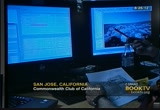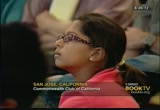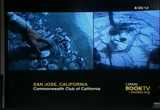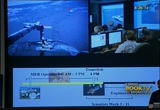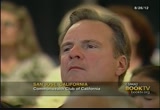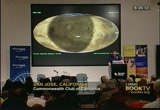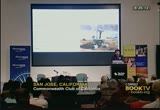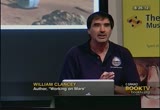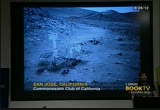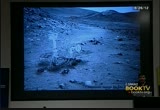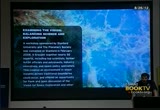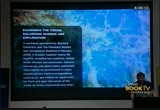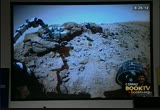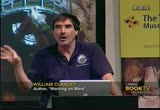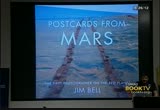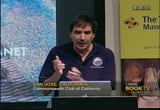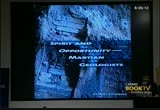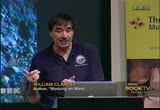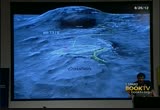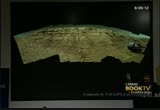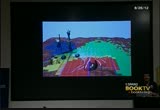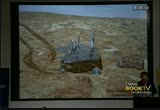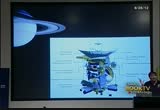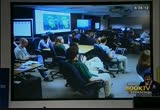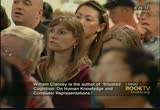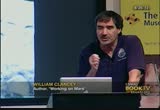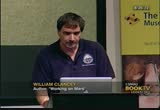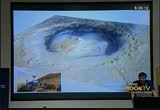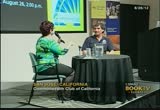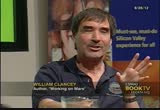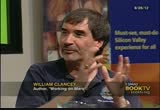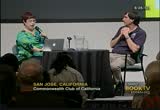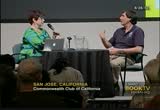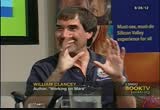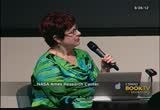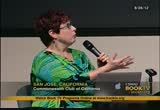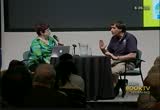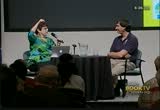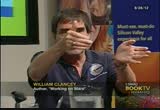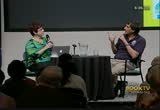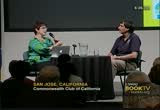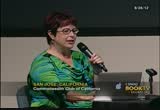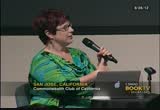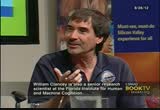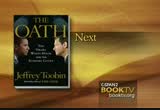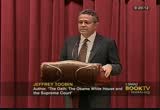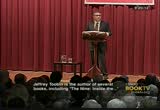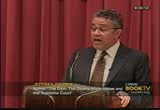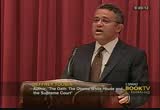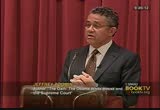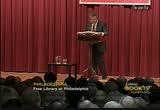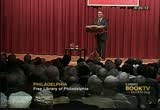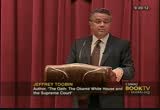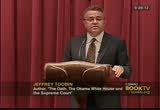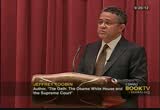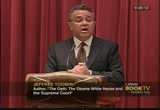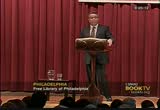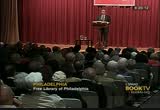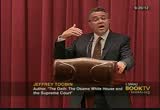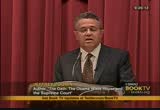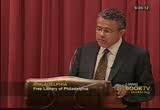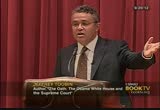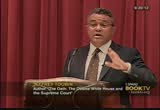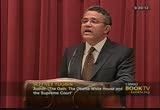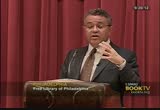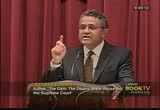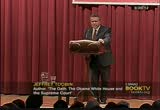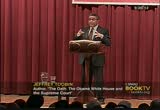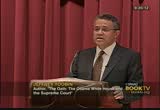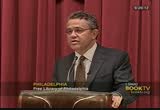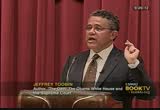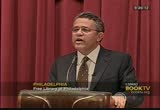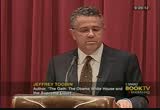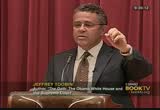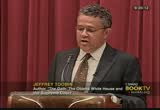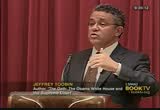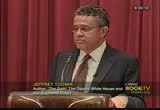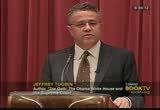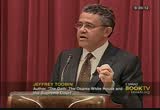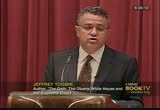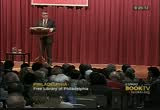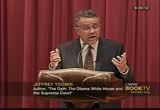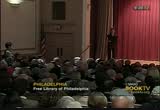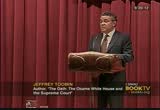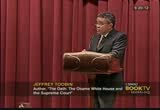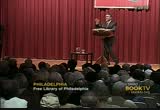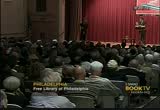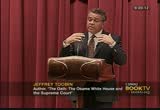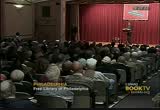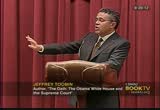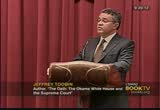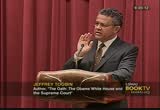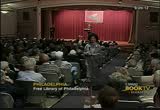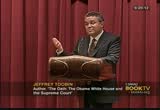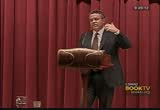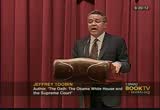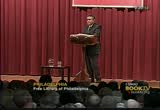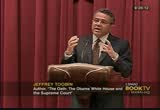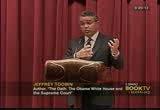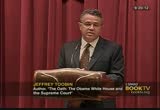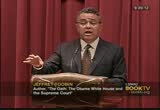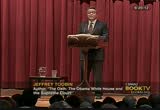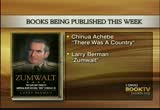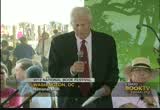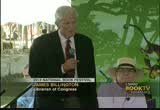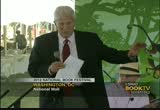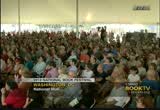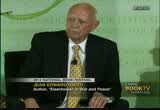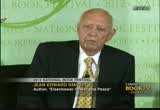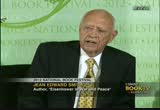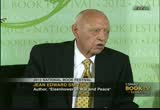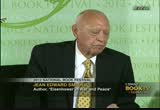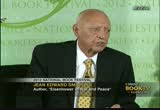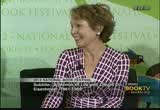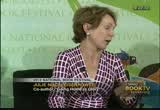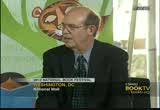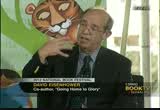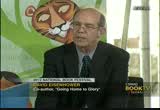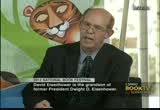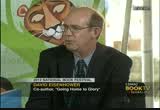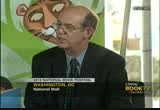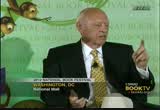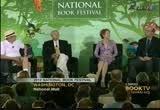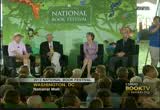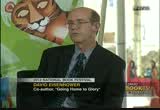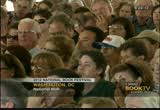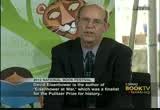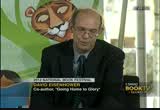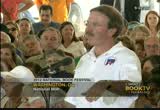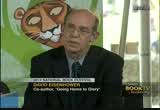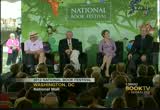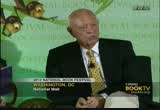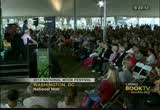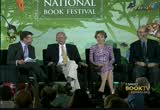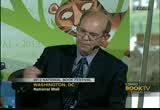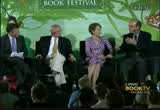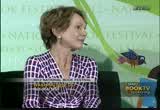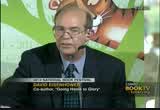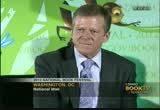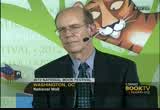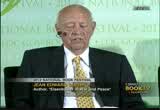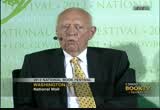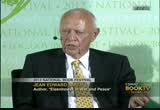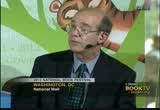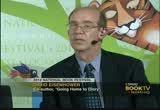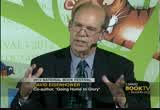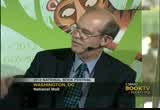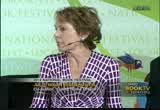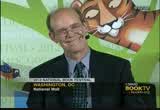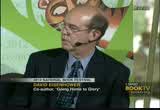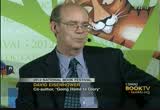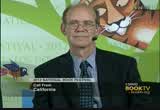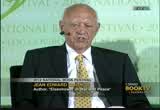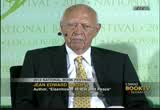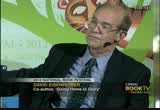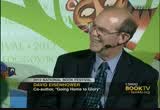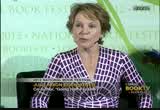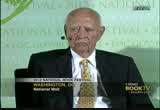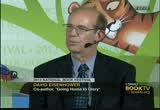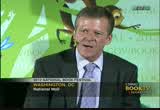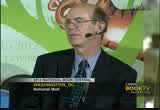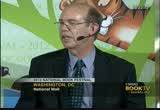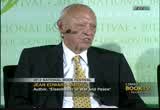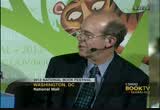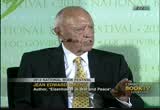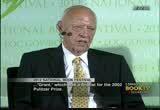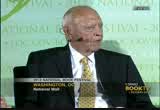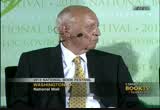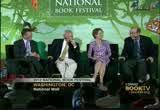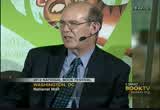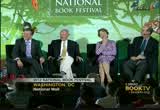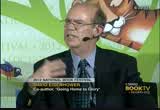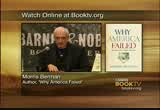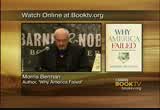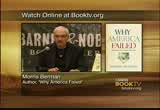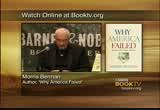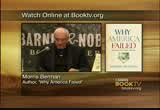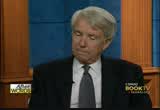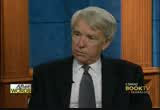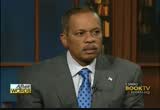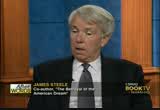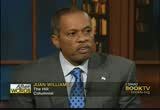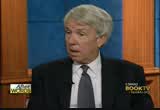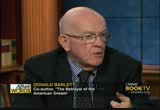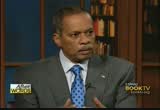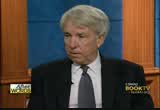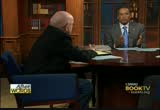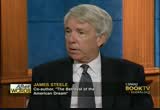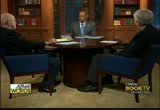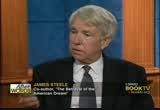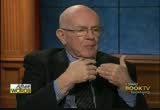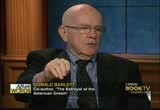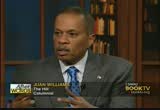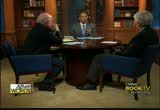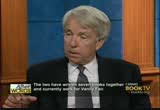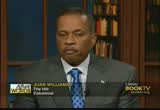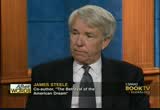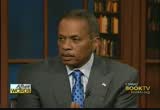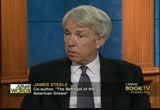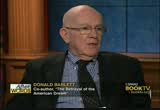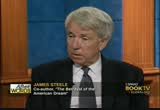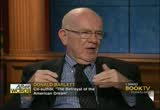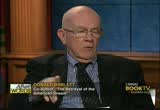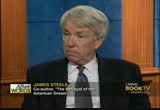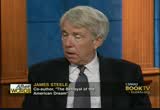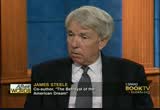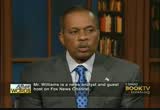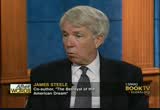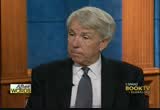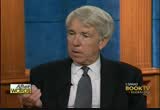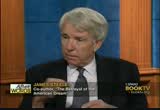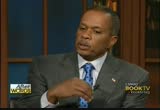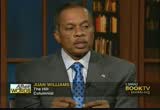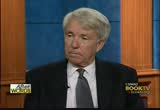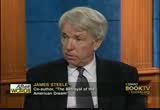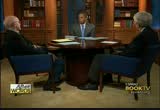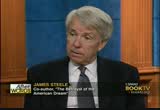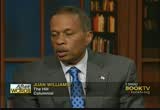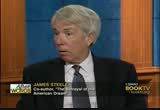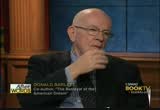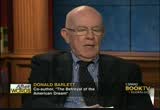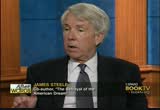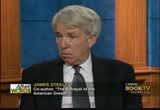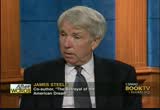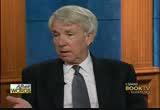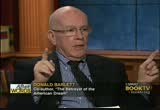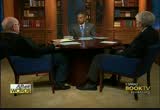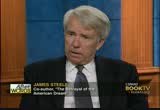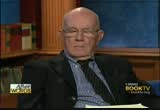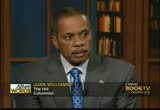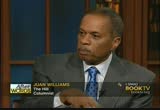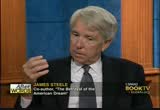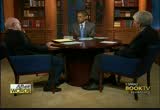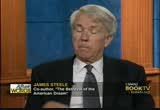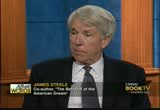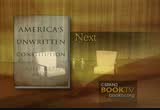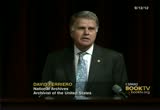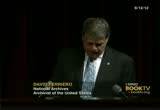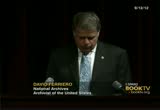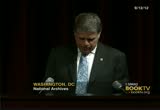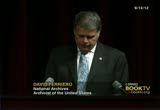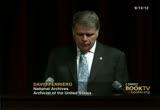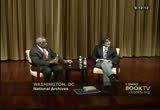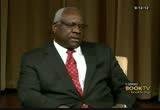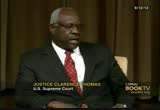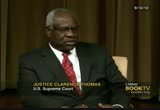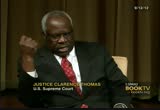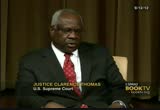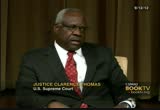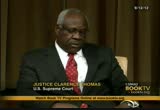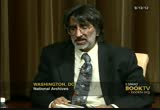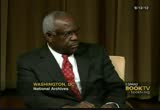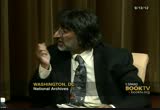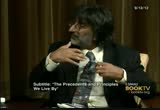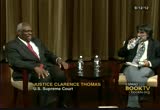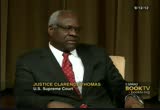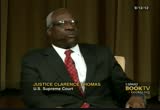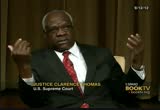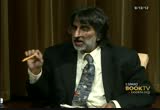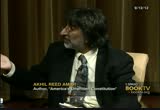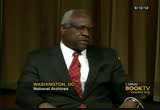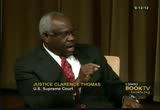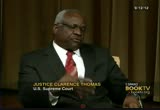tv U.S. Senate CSPAN October 8, 2012 12:00pm-4:59pm EDT
12:00 pm
12:01 pm
targets for a spectral analysis or a microphotograph. combining these planning tools in their imagination, the scientists can work as if they were on mars. jim rice, a geologist on the mission, said i put myself out there in the theme, the rover, with two boots on the ground trying to figure out what -- where to go and what to do. how to make that what we're observing with the instruments. day in and day out it was always a perspective of being on the surface and trying to draw on your own field experience in places that might be similar. david demoray described it this way. the first few months of the mission they had these huge charts on the wall engineering drawings of the rover with all of these dimensions. we'd have some geometric
12:02 pm
question, well, can we see this? can we reach that? is this rock going to be if shade, or will it be in the sun? we'd go and we'd stand, and we'd stare at those charts. and over time we stopped doing it so much because we began to gain a sense of the body. that's projecting yourself into the rover. it's just an amazing capability of the human minds that you can sort of retool yourself. so acting through the robots they control, the scientists look around, they manipulate materials, and they move over the landscape. today may pretend to be the rover crouching down and gesturing with an arm to better imagine what's reachable. and through the eye glasses of special cameras, they can directly see iron minerals in the rocks. they're transformed in a bay to
12:03 pm
a kind of -- in a way to a kind of cyborg on mars. now, that's all pretty different from doing field science on earth. and this is an odd kind of expedition for another reason. usually scientists go off in different directions, different times using their own tools. for mer the entire team was all together. 150 scientists and engineers balancing together, as it were, like on a huge skateboard creeping over the sand, up the down and hills and craters meters at a time for eight years. so it's something like being on a ship, on an early voyageover discovery. the scientists and the sailing crew were all having to travel together. they had to negotiate how long are we going to stay here in where are we going to go next in and what should we do at each site? and this requires a well coordinated understanding of
12:04 pm
their roles, schedules, resources, long-term plans and a clear chain of command. if you visited the science and engineering coordination meeting during the prime mission, which was the first 90 days of landing on mars in 2004, same thing we're going through now with curiosity during these 90 days, you could see the scientists up front on the bridge, as it were, with huge displays of the martian surface that lay before them. behind the scientists, as if below decks on the ship, were the engineers arrayed behind big, square monitors showing the ship's power, memory and an evolving timeline for tomorrow's work. now, this coordination meeting would occur about 6 p.m., just before dinner, local mars time every day. the scientists arrived at work about three hours before, mid
12:05 pm
afternoon rover time. and they were ready to receive photographs and other analyses that were coming back from the rover's work during the day. so you see, the mers are solar powered, so they work roughly on a 9 to 5 schedule. every morning each rover would receive a new program for its day's work. so between dinner time on mars and sunrise, the scientists and engineers must finalize the plan for the next day. and in this requires a second shift of engineers who refine and test that program before it's sent to mars, what's called the uplink. now, if that weren't enough, keep in mind we were simultaneously operating two rovers on mars for over five years. spirit and opportunity were, in fact, two missions operating in parallel. they had their own meeting rooms, as i said, for science operations at jpl, they had
12:06 pm
their own engineering programming teams, 6 p.m. coordination meetings and their own cache, of course, of free ice cream. [laughter] but the teams shared a single mission control center where the engineers attend the monitors, a lot like you can find in houston's mission control. their computers are connected to banks of satellites and earth stations that allow them to communicate with the rovers. so this common engineering activity, sharing this room that i showed a moment ago, required two missions to be coordinated in a special way. if you look at the map of mars with the landing sites of the two rovers, opportunity at mer b and mer a, you'll notice that we landed the rovers about 180 degrees apart near the equator. now, most people would realize that the sun angle is going to be important because of the
12:07 pm
rovers being solar powered. so that's why we put them near the equator. but few people realize how the geography of the mission relates to the problem of commanding the rovers every day. placing spirit and opportunity on opposite sides of mars allowed a single command center and management organization operating around the clock to focus on one rover at a time. controlling them separated by half a day on mars. so this illustrates very clearly why understanding and designing the mission has to be comprehensive, as what we call a total system. the choice of landing sites itself affects the scheduling of facilities and operations in pasadena. so i've described the logistics, the tools and the mental projections involved in working on mars. but there's another angle to how people talk and think about the
12:08 pm
rover that i found fascinating and very strange. it's how the rover becomes the hero of the story in official reports on the web, in the press and even in the scientists' own publications. what i've learned is that anthroto moretizing the rover is both practical and poetic. it facilitates a scientist's work, helping them to work together as a team. and it provides a way for them to express their feelings. nasa's 2001 press release announcing the mer project epitomizes the personification of the robots. quote: in 2003 nasa plans to launch a relative of the now-famous 1997 mars pathfinder rover. this larger cousin is expected to reach the surface of the red planet in january 2004. this new robotic explorer will
12:09 pm
be able to trek up to 100 meters across the surface each martian day. scott hubbard, mars program director at nasa headquarters, said, quote: this mission will give us the first-ever robotic field geologist on mars. now, the metaphors in this poetic narrative such as referring to the earlier mission as mer's cousin simplify for the public's understanding. but they also serve as a kind of cultural cheerleading in praise of america's new robotic explorer. but years later the tone was distinctly sentimental when the associated press reported spirit's demise. quote: spirit, the scrappy robotic geologist that captivated the world with its antics on mars before with getting stuck in a sand trap, is about to meet its end after six productive years. so the melodrama is held as a
12:10 pm
lost person. it's personified by characters in a disney animation. quote: as far as sibling rivalry went, opportunity was the overachiever while spirit was every bit the drama queen underdog. [laughter] surprisingly, lead scientists on the mission are quoted as speaking in the same matter of fact way. the mission's deputy investigator, ray -- [inaudible] of washington university, said he will remember spirit as a fighter. quote: it wouldn't quit, just like the little engine that chugged up the hill. [laughter] now, sometimes this poetry appears a bit overdone, but then we find quite serious descriptions of the rover's character and its accomplishments like a moral in the children's bedtime story.
12:11 pm
the plucky rover will be remembered for demystifying mars to the masses. this is a story of perseverance. talking about the rovers in this way, in the third person, makes it possible for the scientists to tell us about themselves. how they feel about the rovers and the challenges they encountered. this is a personal, emotional presentation that you will not find in the journal "science and nature." now, this metaphor of the robotic explorer actually appeared in the first books about planetary spacecraft in the 1970s, and it has become a journalistic cliche. a few years ago andrew chaikin subtitled his book "intrepid explorers of the red planet. "now, the book is about the scientists' passion for mars, but in chaikin's poetic wrapping, the intrepid explorers
12:12 pm
are the spacecraft. over the past decade, the cliche became a conceptually, somewhat confused debate in the space exploration community. between the advocates of science, meaning robotic spacecraft, and the advocates of exploration, meaning human space flight. partly this was a debate about the control for money. but a genuine question remains about the relative roles of people and robots. as the distances beyond mars make daily reprogramming more and more difficult, and the robots become more able to identify what's worth studying. some have summarized the dichotomy as human explorers versus robot explorers. at a stanford university symposium that i attended in 2008 called "humans and robots in exploration," one topic was quoted to us as when does the
12:13 pm
human become the tool of choice for solar system exploration? by this phrasing people and robots are both tools, and then they ask, very puzzled now, what is the right mix? of course, viewing people and robots as interchangeable tools from the start is absurd. i believe some of the difficulties that arise here are occurring because it's hard for us to understand this new working relationship between people and robots. spacecraft that fly by a planet and carry out a canned program and send the data back as a one-time package are very different from mobile laboratories with sensors and manipulators that are programmed by us for -- every day for years. and it gives a totally different experience to the scientists in carrying out the mission. this new way of working which
12:14 pm
mer epitomizes can be difficult to think about because it's a relationship among people, technology and work processes. it's not a property or a capability that can be ascribed to people or robots independently, and that's why the term "robotic geologist" is so misleading. the relation of people and robots in practical work is difficult even for the scientists to describe. mer scientists have said they could do in a day what took the rover many months. but they're thinking mostly about those long drives. astronauts would leave the rovers in the dust. but there's no shortcut for the hours required to do a spectral analysis or a pixel by pixel scan of an infrared panorama. nobody's used instruments like these in the field before. so how the rover's automation
12:15 pm
and human actions are dependent on each other can be difficult to explain. because we don't think about it in practice. in terms of what's called phenomenonnology, the rover is seen through. as we say, like using a cane. in terms of -- the rover is embodied in our activity. it becomes transparent like a hammer, a boik -- a bicycle or even an automobile. we hit, we ride, we go places. we don't have to think about the machinery, it becomes part of us. the rover's arm reaching out is the mer scientist's arm touching a rock on mars. now, jim bell's book shows a difficultyover talking about this embodiment -- of talking about this embodiment. the title is "postcards from mars: the first photographer on the red planet." as the panorama camera lead,
12:16 pm
he's referring to himself. he writes that the roves have allowed us to be -- rovers have allowed us to be, in a sense, the first photographers on the red planet. now, he puts square quotes around photographers, but i would have put the quotes around "on the red planet," because bell and his colleagues really took the pictures, but they're not actually on mars. they are photographers. how shall we describe this though? who sent the postcards? i believe some of this kind of poetry is revealing that the joint action between machinery, robotic systems and people is difficult to think about and describe. now, these phone cameras that many of you are carrying around in your pockets provide a good example of how viewing robots as being free agents -- robotic geologists -- and giving them credit for doing the work can
12:17 pm
easily arise. cameras like this today are all computerized. so when you press the buttons, computations determine the exposure and other settings. they might even decide thatter taking a portrait, and they'll focus accordingly, and they'll compensate for back lighting. but still you're going to say, i took this photograph. now, separate that button press and the creation of the photograph by something between 30 and 240 million miles and add an overnight delay. now you want to say spirit took this photograph today. all the people and the technology in between just drop out. it's a narrative shorthand. philosophically, though, it raises a question that we call agency, and it's at the heart of the this humans v. robots dichotomy. ascribing agency to the rovers
12:18 pm
appears throughout the scientists' writings. for example, in the planetary report in 2007 matt, a lead mer scientist, provided a superbly readable, technical summary of the science. the title, "spirit and opportunity: martian geologists." in a clear presentation about ancient processes that formed and altered the rock and sand materials near the m everything r landing sites -- mer landing sites, matt alternates poetic attributions about the rovers' actions with the scientists' observations and conclusions. listen to this. after exploring endurance crater, opportunity drove south to investigate the heat shield that it used during landing. next to the heat shield we noticed the only rock seen for kilometers on the plains. opportunity's investigation of this rock revealed it as nickel
12:19 pm
iron meteor right, a very exciting finding as it was our first discovery of a meteorite on another planet. since then spirit as discovered two others. appears that spirit caught on pretty quickly on how to recognize meteorites, doesn't it? so when i first heard this term "robotic geologist," i thought the phrase was just hype, unfair to the people who were actually doing the work, and it had turned the mission's story into kind of a puppet show or something like the wizard of oz. pay no attention to the scientist behind the curtain. [laughter] i wondered -- i worried that this was going to confuse the public and was obscuring the real story about how people were able to work on mars. people might begin to wonder, why should we send scientists to mars if we already have robotic
12:20 pm
geologists working there? i already mentioned how viewing the rover out there on mars provides a way for the scientists to talk about themselves. but over time i've come to realize that this perspective has many practical benefits. as an obvious example, superimposing the rovers'outs on orbital images -- that's why this image is so fuzzy -- provides a bird's eye view of the regions that we've been exploring. we hover over that landscape, we see mer from orbit. the third person view of the rover is also expressed vividly in computer composites like this. they show the rover working alone on mars. it makes you wonder who took this photograph. does this express a wish for us to be present and to see the rover? or does it make tangible the images that scientists and engineers are imagining in their minds? is it another practical projection, another way of
12:21 pm
understanding the rovers' orientation and its context which actually makes the field science possible? here we see the interplay of art, imagination, science and technology all motivating and enabling each other. other less dramatic computer graphics composed with mars images are used routinely to orient the planning and programming of routes and targets. such third person views provide an important way of locating the rover and then by projection locating yourself in the work on mars. yet there's another way of relating to the rover, the second person perspective. when the lead mer rover planner said he viewed the rover as a partner -- i was shocked -- he told me, the rover and i worked as a team. [laughter] he didn't mean, though, it was the same as working with a jpl
12:22 pm
colleague. instead, he was using the best words he could find relating to the rover as a peer to express how he delegated work to the rover. so it would plan portions of the route that he didn't have sufficient time or data to analyze and program himself. he relates to the rover in terms of what i do and what you do. for him this second person i/you relation is practical. the rover is an agent you can rely on. now, talking about spirit and opportunity as investigating, driving and so on has also taken hold, because it fits so well the convention of seen terrific writing many which we depersonalize -- in which we depersonalize our contributions. reports focus on the goals, the methods and the data, the emphasis is on mars, not on the scientists or how they do their work.
12:23 pm
individual scientists are also properly wary of taking the limelight. everyone knows they work as a team. in this respect i was especially surprised to find out that this phrase, "robotic geologist," was pivotal in designing the rover itself and promoting teamwork. a central concept in the original mer mission proposal is that the robotic geologist is a physical surrogate for the science team. unlike the boxy spacecraft that we send to orbit or fly by other planets, mer was deliberately designed to personify a scientist. about human height, a little short, with stereo vision, mobile with an arm holding a hammer, a hand lens and other sensors. combining the disciplinary teams in one persona, mer realizes the vision that they called one
12:24 pm
instrument, one team. the teams that identify with the rover is fundamental to design as steve squires explains. we notice it with the pan cam wide-angle camera. we hit it with a mini test to check for iron. it looks interesting, and we go over and we figure out its molecular composition with the apsx. everything works together. having instruments that work together encourages the teams to work together. this was squires' vision which he called science engineering. he said, you've got those sensors, and each of them
12:25 pm
provides complimentary bytes of knowledge. you're going to use the payload to the fullest advantage. if people look at it as being entirely at their disposal. if you were out there in the field, he says, doing geology with your field partner, you might be arguing about what this rock means or what that rock mean, but you're not going to be arguing about should we use the rock hammer or should we use the compass. we don't have pan cam guys arguing with mini test guys but rather geologists arguing with chemists about exploration. now, to appreciate that you need to know that this design and organization starkly contrasts with almost every other planetary mission, and it contrasts in a way with our current mission curiosity. for example, the kissimmee spacecraft now orbiting saturn has 12 instrument teams each with its own principal
12:26 pm
investigator. remember that mer had one principal investigator. curiosity has 10 or 11. these teams are matrixed, and they have different turfs that they're interested in studying the planet saturn, its rings, the moon titan or the icy moons, the other icy moons. it's at best a consortium sharing a single platform, jockeying for control and resources who gets to use their instrument now. and for how long. the scale and the reality of being two boots on the ground enables and requires a completely different can technical design -- technical design and social organization. rather than features at a planetary scale seen as from orbit or flying by, mer's instrument targets are palpable, and they're directly manipulatable. viewing the rover as a
12:27 pm
geologist's physical surrogate makes sense. so typically, a robot is viewed as an automated machine that acts without human intervention, but the vision of the robotic geologist was broader and multidimensional. instead of replacing the scientists, the robot withic geologist was conceived as a collaboration tool, a way of getting the disciplinary teams to work together. it didn't replace them, it provided a way for them to work together. very, very different. combined with the virtual reality planning tools and the commanding every day that enables frequent individual contributions, the mer exploration system helped the scientists to forge a new kind of field science collaboration. it made them agents on mars working through a mobile, programmable laboratory. so although many people speak about humans and robots in space
12:28 pm
as if there's a choice, human explorers or robot explorers, our relationship to these computer-controlled devices is more complicated. envisioning the field science, the scientists become the rover, a first person view. they are on mars. programming the rover's drive, an engineer may view the work as a joint accomplishment, a second person view. and then working as an ensemble, acting together through the rover's hardware and software systems, everything turns inside out in this third person perspective. the rover becomes the team, and they can rave about its exploits proudly. i would paraphrase that associated press story about spirit's demise by saying this intrepid team of scientific explorers will be remembered for demystifying mars to the masses. this is a story of perseverance.
12:29 pm
the mer scientists and engineers have invented a new practice of planetary field science. these are their foot prints on mars. the robotic geologist metaphor in this metaphor, the team tolerates and in some ways they revel in their anonymity. the more fantastic the historic exploits of spirit and opportunity, the more proud you can feel to play even a small part in this mission. this projecting of personal ambition onto the group's effort and its accomplishments is no small part of our power and joy as human beings. so the accomplishments of mer are intricately based on relating technology to both the psychology and sociology of people. it is a textbook example of how to design a complex system of
12:30 pm
people and machines. so reaching a conclusion now, the mer mission objective was to travel about a third of a mile in a 90-day mission, taking perhaps dozens of photographs and learning something about the history of mars. in this extended mission over an unimaginable eight-and-a-half years, we've traveled over 25 miles, taken 300,000 images and spectral scans. the science itself could fill a textbook or two. now with a somewhat elderly craft, we've arrived with opportunity at a deep crater 14 miles wide called endeavor with clay soils and new layers to investigate. we waited out the last martian winter at greeley haven with this commanding view of endeavor crater. tilted toward the north to
12:31 pm
better catch the sun on our dusty solar panels. this image from an amazing panorama was completed in may. as of july, we've been working on mars for over 3,000 martian days, and the voyage of scientific discovery continues. using high resolution images and scans from from orbit, we've identified an interesting min min roll along endeavor's claim. since arriving we've been exploring cape york, and eventually we might set a course for slander point. opportunity will almost certainly spend its last days or years here at endeavor. meanwhile, as you all know, another mars rover -- a relative of mer -- has landed in gayle crater. she will climb and explore the central mounds of mount sharp over several years. it towers three miles high over
12:32 pm
the floor of the crater and has been built up over perhaps two billion years. we'll be especially working for carbon-based materials that are essential for life. nasa calls this rover the mars science laboratory or msl. it's loaded with new instruments and weighs about a metric ton, five times of mer. now, perhaps with the name science laboratory instead of robotic geologist, the mer experience has clarified the true nature of these spacecraft as tools for the scientist, and perhaps this time they will place themselves more publicly in the driver's seat. but you'll be sure there will be more poetry. like spirit and opportunity, msl has been personified by a nickname. they call her curiosity. and perhaps you can already see how this will play out.
12:33 pm
thank you for your attention. [applause] [inaudible conversations] >> well, thank you for that. we do have some of your questions already ready here, but we will continue to take them. we're going to talk for another 20-25 minutes, and i do ask that if you have time constraints and need to leave, if you could do so by the back, because it's much quieter that way. >> you're going to mention the book signing. >> we're going to mention the book signing. the books in discussion are available in the gift shop which is right outside the door here, and you'll be staying for signing. >> i will. and as a civil servant of the government, i don't receive any royalties, so the price has been set very low, and i hope you all enjoy it. [laughter]
12:34 pm
>> let's talk a little bit about the idea that these machines have proceeded us to mars. is it still, ultimately, the target to put a human being there? >> for sure. and it's sometimes very surprising if you talk -- all of the scientists i spoke to really want to be there. they, they sense that they need to be there in order to do exploration the way it should be done. and part of it has to do with all those limitations that i talked about. they all want to go in different places. we'd accomplish a lot more with six people than six people standing on a skateboard together. and i think your point, though, about anticipating or preparing has become more and more real. i don't think we understood that so well before mer. that we could for reasonable cost put these rovers in different places around mars and figure out where would we want to go, where should we land, where should the human landing be. >> so what's the time limit?
12:35 pm
>> what's that? >> what's the timeline? >> write to your congressman. i'm not allowed to lobby. [laughter] it's all about priorities. >> one of the things that a human could accomplish that you mentioned the limitations of the rovers, the right-of-ways are dependent on the sun, and they need to stay near the equator. so it strikes me that some of the science that we're missing out on so far has to do with the ice poles, the polar caps and the water systems, that sort of thing. are there other bits of science that will have to wait until a human can get up there without those limitations? >> well, we actually have had a lander, phoenix in 2008, went to the mars arctic. so there we were looking specifically at landing on ice as we did and understanding how ice causes different formations there and understanding the chemistry. so there are limitations. i think with curiosity, though, we have learned now with this combined, um, retrofire and soft
12:36 pm
landing of the sky crane that's quite general. for the air bags, we were limited to areas where you, the atmosphere was strong enough so that you slowed down enough before you dropped the bag. and so i don't -- i think it's more the topology. many people would like to land in this area that is like the grand canyon that extends for 3,000 miles across mars. to do that kind of a landing would be very tricky, but we've now gotten pretty close to that. >> as a percentage, how much of mars have the various programs discovered, and that includes the polar expedition. >> as a percentage. well, you know, i describe this with one of the, a couple of the scientists as being an easter egg hunt. it's like, okay, mars has so many easter eggs, and we need to know -- so how much do you have to explore before you have a sense you've seen all the typical eggs, what's to be found? and if you think about it, there's no way you know.
12:37 pm
you can tell quite a bit from orbit about different topographies, but we have areas, for example, there are caverns where lava tubes have collapsed, and we see skylights. so there was a mission that was recently announced to send the rover down into this lava tube because a lot of the astrobiologists believe that's where life would be today, especially protected from radiation. maybe there's nor moisture down there. so there's different habitats, pike the word, to use. so the answer is we have no idea what percentage we have -- we have scratched the surface. you might think about it as like landing and the vikings landing in north america, and the word viking is appropriate having been a 1976 mission, '77, and now you're asking, well, how much more do you need to see before you understand north america as a whole? [laughter] right? >> i love this question from one of the audience members, how do
12:38 pm
you know what time it is on mars? >> well, there's two answers to that. one you've got a special or mars watch that tells you the time -- [laughter] but it turns out that the whole issue of time on mars is very complicated. once you get into it, you realize that time on earth is a lot more complicated than you thought it was, and what you know about a leap year is a great simplification about something that's a lot more complicated than add a day every four years. so, actually, one of my colleagues who i cite in my book, did a dissertation about time on mars, just on that topic. so i would just point out the whole issue that mars has 24 hours, so what did that mean? that meant they had to decide that a second on mars is longer than a second on earth. that sounds very weird. why don't you just say that it's more than 24 hours? >> right. >> but, of course, that'd make a
12:39 pm
clock look rather funny. but you could do that. i thought a second was, like, a physical, you know -- >> hard and fast. >> -- notion, you know? >> right. >> like we would define a kilogram or a meter, but it's not. >> as you're coming up through the sciences especially with planetary science, you discover pretty early you can't always stay on the same clock as the rest of the human beings if you're going to do observations from some of the great, you know, observatories. you need to stay in a room where, you know, there are blackout window shades in the daytime so you're up and working all night. once you get to the level where you're working on a martian mission, doesn't it take a toll on the body even though you're earthbound? >> absolutely. when i did my two weeks at pasadena, i picked a time when i thought they had reached some stability so they weren't still figuring out how to program everything. but i conveniently chose a time where like 6 a.m. on mars was 5 a.m. in pasadena. and then every day i just got
12:40 pm
later or and later. so it was easy for me to get onboard, and i did the same for phoenix as well. you can pick a time. but the scientists, of course, are just moving. and the bottom line is it seems to affect different people differently, but they've gone ahead and continued to do it and will -- are doing it right now for curiosity, the scientists in pasadena are on martian time. there's a wrinkle there that we have learned that they don't need to be exactly 40 minutes. they should really report for work when the data starts coming down, and that has to do with when is the relay satellite, odyssey, or one of the other satellites sending the other data back. so we give them a special schedule, and they might come at the same time and then shift. but the bottom line is you can't really take a team like that going for too long. and they have their families. some of them are european and japanese, and they have more time zones to worry about. >> what advantages are -- this is a question from the
12:41 pm
audience -- what advantages are there in having humans orbiting mars while interfacing with the robotics rather than conducting it from earth? >> that's a great question, and that's how it's going to be, too, i mean, for sure. when i've discussed with the scientists and engineers, we've many times said, okay, we've actually had what we call blue sky meetings where we bring people together and we do imaginings of let's say that's the case, let's say we were even saying you're on the moon, and you have something like these mers. you drop them off of your rover, your pressurized rover, your vehicle, or you might send them ahead and do reconnaissance. so there's all kinds of possibilities. we will definitely have these programmed devices, and maybe some of them will be able to scout and look for things, and we'd say go look for silicon or clay and take a picture and let us know when you get there. >> let's talk about the idea of life on mars, and i doubt there are any scientists who expected
12:42 pm
the first camera to open and have an eyeball staring back -- >> well, you know, the joke is the martians are jumping around so they can't be spotted -- [laughter] that came from 1976 and '77, yeah. >> but when you talk about life on mars, you're talking about anything from the very tiny to my croak y'all. >> yeah. it's going to be tiny or tinier. >> so one of our audience members puts it, say the mission finds, yes, there was life. what next? how does that help us? >> well, certainly you're going to be analyzing -- this is going to be the biological time probably of the time, of the era. you want to know, is it dna? do you recognize how the amino acids are put together? does there appear to be something like dna and rna that consists of other amino acids that are in a different order and it's just a different program? um, that -- the significance,
12:43 pm
you can imagine, is two-sided. one, there will be some possibility that that means that life started first on mars, and we are martians. that'd be a surprise. or life was independently created on mars, here your closest planet which doesn't look that lifelike today, habitable, and now we're discovering thousands of planets out there, and we'll soon know of many where life could be. that will suggest it's much more likely that those planets that the keepler mission is finding, keppler, could have life on it. that'll raise the probability incredibly. >> is there a goal whether expressed or implied, when nasa goes out in search of possible life forms, is there the idea of exploring places for human colonizationsome. >> you know, there's like a parallel, multiple parallel lines here, and there's definitely people who are thinking more about, you know,
12:44 pm
if you look at their articles, they're saying, well, look at this, this cavern here, this ravine. we could have, like, a habitat on the wall inside. and, you know, that's their designing. and they're saying and the water could be coming from the ice over here. and that's what they're imagining. so, you know, the direct connection is not that strong right now because there seems to be water/ice throughout the planet. that would be something we would want. >> one of our audience members wants to know about recording sound on mars. are they currently or will they? >> let's see. this was an issue for phoenix, and i think there was a problem. but i'm almost certain msl -- go look on the jpl web site and look under msl. i believe there is an instrument for that. >> okay. but it's not -- currently, we're not going to be able to hear sound from curiosity or -- >> well, the sounds are -- i'm not sure, you know, it seems
12:45 pm
like somebody should have done a simulation of what it would sound like. i think it would be very low. but as you can imagine, if you were to blow against that microphone, it could sound like a hurricane, but it was just, you know -- so this relationship is not necessarily intuitive. >> but you can hear the martians jumping around outside the camera. [laughter] >> that would be, we would get the vibrations, i think. >> what danger do the rovers have from solar flares? >> solar flares -- now, this is an area i'm not a specialist in. i believe -- i think it's best to think of radiation in general, and you have cosmic rays and solar flares. the bottom line is that the computer circuit systems are radiation-hardened. that's why if you look at what curiosity has, you'll see that it's not quite as good as the phone computer i have in my pocket. and it has to do with what it takes to shield them and deal with the temperature differences. so, absolutely, that's a consideration. >> let's talk about how well
12:46 pm
they do, and if you have mers outliving their expected lifetime, how do the teams adapt with the science as they go along? if it's expected to run for six weeks and it's up there working for two years -- >> well, the scientists are human beings, they're sign difficults like myself, and they get funding from different sources, and they're always trying to make ends meet. so mer has been for very few people a full-time project. i don't know necessarily that any science -- not even steve squires -- are full time on the pig for eight years. what else surprised me is i have a chapter in the book about the personal nature of their scientific lives. they're all off doing other things, and they're writing about other topics. you read about natalie who runs expeditions in the atacama or the high andes lakes, they're out being explorers while they're on this mission. >> but to keep science flowing, i mean, to take advantage of
12:47 pm
that extended time. >> well, it's actually perfect from the perspective of bringing in new people. so, um, in many my book i interview eileen yanst who was part of the second rotation. so they very early -- i forget what the year was, but it was within a few years -- they brought in a whole new set of scientists and she writes about what it's like to come onboard. she said it's like drinking from a fire hose and, of course, you have the team that's well established. so it's a very interesting thing. but that has been ongoing. and over this period of eight years you bring in your graduate students, and then you have summer interns and there's been a lot of that turnover. >> you mentioned the word funding, and, of course, funding's a big deal with science. and you have the high profile curiosity and all the support for that, and that's the peak of funding and public approval.
12:48 pm
and then you have, you know, a congressman holding up a little green man on the floor of congress and saying we're looking for little green men, and that would be the nader of funding. how to do you weather that knowing that your funding to some extent is a measure of popularity? >> well, it's interesting. i think the most important constraint right now, i mean, we have a national budget problem that everyone knows they have to deal with, and nasa's being very fairly treated overall within that range. i mean, in the sense of getting what it's always gotten, one could think it might have gotten more, but it's not facing a huge cut. our biggest problem is more internal in that we have two missions that cost a lot more than we expected. one is curiosity, and one is the james webb observatory which is a next generation of hub el. james webb is up to over eight billion. so this hurts some of the other missions, and the scientific
12:49 pm
community is being asked to live within the budget. now, one might argue that they deserve some slack here and to be given more. but really i don't think it's so much popularity as dealing with the fact that they have a fixed budget. >> uh-huh. >> it might be great if the public wanted to argue that their budget shouldn't be so ticketed, that would be a separate matter. >> some people say we have americans starving, we have infrastructure that's crumbling, why are we throwing money into mars? what do you say to those people? >> well, the cliche responses are the money's being spent on earth, it's not being spent on mars. and it's leading to new technologies. anybody who looks at the curiosity landing can see that we have just demonstrated how to land quite heavy pieces on mars. and that is now a very general thing that's going to be done for decades to come. you could land habitat modules,
12:50 pm
power plants, pressurized vehicles. you could start bringing down with this precision landing a bunch of pieces through separate missions. you don't have to have a gigantic rocket which brings everything at once which would be much more of a risk as well. so -- i forgot what the question was, but that was the important answer. [laughter] >> we were talking about justifying space travel. >> yeah. so you're seeing a capability developed that is very general. now, i think if you ask what would be the effect on our sense of pride and enthusiasm to have an american colony on mars, compare that to other sites. it's a matter of prioritization really. >> what about the rise of privately-funded space exploration? how do you see that playing out? >> extremely important. i think in the next five years
12:51 pm
it's going to -- we're in major transition right now on human space flight, and i think there's a lot of us, people in the program who believe we can be five and certainly ten years there now where low earth orbit, sending astronauts and supplies back and forth to the space station and big lowe's hotel that he would like to build an inflatable hotel and these suborbital spacecraft that are going to be sending people up within a couple years, joyrides, you know, that's going to be commercial. now, where the money is to be made, um, the big idea i think that everyone's caught on to is, well, what if you had these for-profit companies contract to provide fuel and water in lieu far orbit, say -- lunar orbit, so that nasa could use it on the moon or take it out to an
12:52 pm
asteroid or onto mars. once you get out of the gravity well. so there's going to be a lot of value for nasa, and it'll be much more competitive and better priced. >> you talked about the probes reaching further and further into the solar systems. one of our audience members wants to know what kind of human operational protocols are eventually going to be automated when they're reaching that far away. >> well, i think, you know, you can see with kissimmee it isn't planned day by day. they know more over several months what the program's going to be. it might be, you know, you could compare it to hubbell where they don't decide today what they're going to look at tomorrow. so there would have to be another study, and i have a colleague, jennifer, who's on the kissimmee team, an anthropologist who's studying the team, and i'm looking forward to her report which i think will show they don't have the same engagements because they're not able to get in there
12:53 pm
and individually say here's -- i have this idea, and this is what i'd like to do. they might have to wait months before their idea could be realized. and they have all these competing themes. it's a little different story. so maybe not as chummy and rosy as the mer story. >> it's interesting when you think about, you know, the further we go into space, there's a certain poignancy. you were talking about the humanity and human side of this. there are humans who are going to be contributing significantly to programs they may not see the end of. you can work on something and see the blastoff and be so pleased, and by the time it gets where it's going and starts coming back, you may not be will to see it. i'm sure the scientists have to think about that. >> for sure. and certainly any mission they work on they'd like it to be in their lifetimes. and i feel more of that than i had sort of expected to find in asking them. i saw a lot of their motivation was they want to know about mars, and so they want to know how do they get these answers in
12:54 pm
their lifetimes. see? so it isn't just the missions, but scientifically are they going to find out sometime even after they're retired? >> but when you talk about pluto or moving closer to the sun -- >> these are, by definition, multigenerational missions. you know, nine years, there's people who started it who are retired. one of the people -- and i deliberately chose michael carr as one of the scientists to interview for my book was he retired -- because he retired right after he was at jpl. so to see that kind of transition. >> uh-huh. let's talk about the dangers of anthroto moretizing our rovers as we put them up there. i was following the tweets of the martian -- of curiosity, and ask sometimes they bridged into the adult. and it was great fun, it was wonderful, but as soon as you start injecting that humanity, you -- a lot of people get in trouble on twitter. [laughter] i was wondering about how much
12:55 pm
of a burden it is to say, oh, now this is as much our mascot as it is our scientist. >> well, i think that is the truth. and that was probably my biggest surprise in going through my work over these eight years, because i did start, as i said, rather upset when i first saw that 2001 press release. i was at hart and rater in july when it came out, and i remember ranting and raving to anyone who would listen to me who is this steve squires, and why is he saying these on sudden things? robot wick geologists, we're in -- robotic geologists, we're in big trouble. i mean, the last thing you want to say to the public. and to find out that it was actually useful, that it played a role in the design and that it enabled them to say things that they wouldn't be able to say, um, and it made everything sort of fun as well. and i don't know how many people were really fooled.
12:56 pm
so it's complicated, and it's -- i think also the way i put it in the book as an afterword really is to say, you know, you can be a scientist, and you can be poetic at the same time. and i think squires just epitomized that. squires told me, we went to the top of that hill, and we took a photograph because it was a cool thing to do. [laughter] he said, you know, did it have scientific value? well, he was willing to say it didn't matter. and even though, you know, if you work out how much it might have cost, it's a great image. and so that willingness to be a person as well as a scientist i saw throughout, and i think that's what we need to realize. you don't reissue a rigger by having the poetic aspects and artistic interest. >> we're down to just the last
12:57 pm
couple questions, and for one of these i'm sure curious minds very much want to know. the wake-up songs for the rovers have been different over the years. wake-up songs for the various rovers have included "love me like a rock," paul simon. come fly with me, wake up little susie, the simon and garfunkel version. radar love, the theme from mission impossible and, probably my favorite, where is my mind by the pixies. [laughter] so the burning question is, who gets to pick the songs? >> actually, you know, i was only tangentially aware of that, and i recognize it from your telling it. i really don't know. so it sounds like a great talk for somebody -- [laughter] probably i would say it's jpl, within their team probably. >> okay. and we can tell from their dress code they're a wild bunch, so that explains a lot of the songs. the last question i know you are
12:58 pm
an expert in, and that is your own trajectory into coming into planetary science and enjoying it and living with it. and i can see you're still enthusiastic about it. what have been the high points and the low points for you in the world of science, and what keeps you enthusiastic about it? >> well, the whole -- my whole time at nasa which is now almost 15 years is a high point in my career. so bringing -- i'm a computer scientist, but really with the psychological/philosophical bent. and i'm interested in taking photographs, many of those are my photographs. and i like being outdoor cans and camping. i've been able to do it all with nasa. and i never anticipated that. and i certainly remember the day of the landing on the moon, and i could have recited to you all of the difference -- different astronauts and neil armstrong who we just lost. so i was always -- i didn't want
12:59 pm
realize that you didn't have to be a rocket scientist or a military test pilot to work for nasa. and i've hired linguists and anthropologists and psychologists on my team. so that's a real high point for me. and the downside is, well, i haven't yet gotten -- you don't see me at jpl studying curiosity, and maybe somebody else is doing that. [laughter] >> got it. well, i want to thank you so much. this has just been great. and i hope that you've all enjoyed this afternoon's program. [applause] >> is there a nonfiction author or book you'd like to see featured on booktv? send us an e-mail at booktv as c-span.org or tweet us at twitter.com/booktv. >> jeffrey toobin reports on the relationship between the obama administration and the u.s. supreme court. the author examines the recent addition of four justices in the past fife years -- five years and how it has affected the court's decisions on numerous
1:00 pm
cases including its recent ruling on health care. it's about an hour. [applause] >> thank you, mark. hello, everybody. so excited to be here in philadelphia. you know, i know that's just the usual pandering that goes on by speakers, but in my case it happens to be true. i am not myself from philadelphia, but my dad, jerry toobin, was overbrook high school -- [applause] oh, yeah. the panlderring has just begun, don't worry. [laughter] curtis institute, i don't know if we have any violinists here. and he went to temple as well. [applause] so, you know, and e taught me that -- he taught me that the streets were paved with tasty cake here, and i have enjoyed my visits ever since. [laughter]
1:01 pm
i would, um, i'm really happy to be talking about the oath today, it only came out two days ago. so far so good. [laughter] and, um, it's, um, it's, you know, it's exciting to -- you know, you work on these books in silence and quiet and, wow, people actually read them, it's exciting. [laughter] so let me start by asking the first question that i know is on your mind which is, who's your favorite justice? [laughter] now, it's not elena, she has to earn it. she's only been there a year and a half so far. i'm a little -- i'm still struggling with that question because for so long my favorite justice was david souter. because he was so delightfully odd. [laughter] he didn't have a cell phone, he didn't have a computer, he didn't have an answering machine on his phone. he was late for william rehnquist's funeral because they
1:02 pm
couldn't leave a message and find out where he was. [laughter] he didn't like, doesn't like electric light. he moves his chair around his office over the course of the day to catch the sunlight. true story. [laughter] but the great thing about justice souter was that he, um, sort of got the joke about being a supreme court justice. he understood that he was important, but it wasn't really all about him. and i'll just give you one example of that. for reasons that remain obscure, david souter and stephen breyer are frequently mistaken for each other. now, if you know what they look like, they really don't look anything alike, but people only have a vague sense of who these justices are, and one time not too long ago justice souter, as he often did, was driving from washington to his ohm in new hampshire, and he stopped at a restaurant to get something to eat. and a guy came up to him and said, you're on the supreme court, right in he said, you're
1:03 pm
stephen breyer, right? and he didn't want to embarrass him, so he said, yes. [laughter] and the guy said, so, justice breyer, what's the best thing about being on the supreme court? he thought for a minute, and he said i'd have to say it's the privilege of serving with david souter. [laughter] now, how can you not love a guy like that? i'm taking mom nations for my -- nominations for my favorite justice after that. okay. so let's talk about the current supreme court by the numbers for starters. well, there are six men and three women, first time if history there are three women on the court. [applause] there are, there are six catholics and three jews. what, no applause? no catholics, no jews here? [applause] yeah, no protestants for the first time in history. there are representatives of four new york city boar roes on -- boroughs on the supreme court. there is justice sotomayor from
1:04 pm
the bronx, justice scalia from queens, justice ginsburg from brooklyn and justice kagan from manhattan. tragically, staten island is unrepresented on the supreme court, but you never know when there might be vacancies, and we might address that gap. [laughter] there are six products of harvard law school and three products of yale law school on the supreme court. there are apparently no other law schools in the united states. [laughter] besides those two. no, it is a bizarre and unfortunately fact, i think. but those are, i hope, interesting facts about the supreme court. but frankly, i don't think they're very important. here's an important fact. about the supreme court. there are five republicans and four democrats. i will speak for somewhat longer, but this is basically all you need to know. [laughter] if be there's a takeaway here, i
1:05 pm
have gotten to the point early. there are five republicans and four democrats, and that really tells you much of what you need to know. and it is true that the justices wear robes because they're supposed to look all alike, and they're supposed to look, you know, it's supposed to give the perception that they're all pretty much the same, but just as on the other side of first street the united states congress is deeply divided according to party, so is the united states supreme court. and this is a moment of real partisan division at the supreme court, um, and that is ex'em mified in case after case -- exemplified in case after case. why this moment is so important, i think, you need to go back in history in the supreme court to a different period, um, in the court, to the mid '60s and the late '60s because that was the
1:06 pm
last time the supreme court was really a unified ideological force. it was not divided so narrowly. there were seven liberals on the supreme court and the late days of the warren court. and there was a real liberal agenda. every saturday morning chief justice warren and his great deputy william brennan would meet together, and they'd say, well, what cases do we want to take? where do we want to move the law? they really had ideas about how to move the law. and year of after year they changed cases, they changed the law. 1964, justice brennan's famous opinion in new york times against sullivan revolutionizing libel law with important new protections for the press. 1965 justice william o. douglas' opinion in griswold v. connecticut, shade married couples -- said that married counsel les could -- couples could not be denied the right to buy birth control. and perhaps more importantly,
1:07 pm
changing television dramas forever. [laughter] 1967, the -- perhaps the best-named case in supreme court history, loving v. virginia. what was the case of loving v. virginia about? it was the case that said states could no longer ban racial intermarriage. think about that, 1967. there are people in this room who were alive in 1967. [laughter] and it was still illegal in lot of states for racial intermarriage. you know, when barack obama's parents got married in kenya -- i'm sorry, in -- [laughter] it's such a cheap joke, and i apologize for that. but it does remind me that, you know, everybody knows mitt romney is having a rough, rough patch as presidential
1:08 pm
candidate -- [applause] but, all right, all right. yeah. but, you know, a sentence that i have not heard uttered anywhere is if only donald trump had been the nominee. [laughter] because as you recall, he sort of built his campaign around the idea that barack obama was born in kenya or somewhere other than the united states. but that campaign did not take off exactly. [laughter] and mitt romney is there for better or worse. and it is -- and in all seriousness, you know, when barack obama's parents got married in 1960, and it was in kenya -- it was, i'm sorry, it was in hawaii, it was not a freudian slip, that was just wrong. they got married in hawaii. there were people in prison in this country for racial intermarriage. i mean, that's no joke. it was illegal in 20 states in 1960, and it just gives you an idea of how much the country has changed in a good way.
1:09 pm
but right after richard nixon became president, four vacancies appeared on the supreme court. you never know how that's going to work. jimmy carter is the only president in american history to serve a full term without having a single nominee. there were no vacancies. but richard nixon was only president for five-and-a-half years. you'll recall he had to leave early, remember? laugh but he got four appointments to the supreme court because chief justice warren left, abe fordis, john harlan and hugo black left. and they were replaced by richard nixon with chief justice warren burger, harry blackman, louis powell and william rehnquist. and as you think about that list, it illustrates a theme that i think is a very important part of the oath, but it is the theme of american politics over the past generation, and that is
1:10 pm
the evolution of the republican party. it is the most important story in american politics, it is the most important story in the supreme court. because moderate republicans dominated the supreme court for two generations, and moderate republicans are gone. they are gone at the supreme court, they are gone in the united states congress. arlen specter, as you all know, is fighting for his life now. i had the privilege of covering senator specter who is a great character for, often during his long tenure in the senate. and he left the republican party literally, but the republican party had left him well before that. and as you look at nixon's appointments to the supreme court, the 19 70s -- a lot of people thought the court's going to move to the right, the '70s
1:11 pm
were almost as liberal as the '60s. the nixon tapes case, they essentially forced nixon out of office. the pentagon papers. they awe proved school busing. -- approved school busing. they end the death penalty in the united states in 1972. they let it back in in 1976 and still the most controversial decision of them all, 1973, roe v. wade, the decision that said states could no longer ban abortion. it was a 7-2 opinion, and the only two dissenters in roe v. wade were byron white who was appointed by president kennedy and william rehnquist. three of the four nixon justices were in the majority in roe v. wade, and i think that tells you a lot about where the republican party was in the 1970s. 1975, um, william douglas stepped down, president ford nominated john paul stevens to replace him. in his confirmation hearings, he was not asked a single question about abortion because it was not part of the political
1:12 pm
dialogue in the way that it later or became. um, the big issue, the big change began in 1980, of course, with the election of ronald reagan because ronald reagan brought with him to washington, um, a very underrated figure in recent american history, someone who i don't think gets his due as an important person, and that's edwin meese. because edwin meese at first as an adviser and then as attorney general said, look, there has been a liberal ayen da at the supreme court -- agenda at the supreme court, there needs to be a conservative agenda at the supreme court. what was that agenda? expand executive power, end racial preferences intended to assist african-americans, speed up execution, welcome religion into the public sphere and, above all, um, reverse roe v. wade and allow states once again to ban abortion. a big part of the reagan revolution, um, was the arrival in washington of a group of young and committed conservative
1:13 pm
lawyers who wanted to work in that, on behalf of that agenda. who were two of the best and brightest of that group? john roberts and samuel alito. 197 finish -- in 1985 in a memo plotting litigation strategy at the solicitor general's office, alito wrote: what can be made of this opportunity to advance the goal of bringing about the eventual overruling of roe v. wade? later that year applying for a promotion he wrote: i am particularly proud of my contributions to recent cases in which the government has argued in the supreme court that the constitution does not protect the right to an abortion. samuel alito then, samuel alito now. but the republican party of 1980 was not the republican party of today either, and we saw that in re began's nominations to the -- reagan's nominations to the supreme court. 1981, potter stewart unexpectedly announced his resignation, and reagan had made
1:14 pm
a campaign promise that, um, jimmy carter didn't even make in the 1980 campaign. he said if i have the chance, i will nominate the first woman to the supreme court. and reagan said, look, i have my chance, go find me a qualified woman. it was not a simple thing in those days because there were not a lot of women, especially republican women in the traditional pipelines for supreme court appointments. so reagan's people went all the way to the intermediate appeals court in arizona, not even the arizona supreme court, to find the remarkable figure who was and is sandra day o'connor. sandra day o'connor was not then a social conservative or a religious conservative or anything like the kind of conservatives that dominate the republican party now, and that was fine with ronald reagan. he didn't care. it wasn't his agenda either, and he was very proud of his nomination of connor. o'connor.
1:15 pm
1986 chief justice berger stepped down, reagan elevated rehnquist from associate justice to chief justice, named antonin scalia to that seat. no question about it, hissing, booing coming -- [laughter] no question about it, conservative. the following year a really key turning point in the history of the supreme court. 1987 louis powell stepped down. louis powell was at that point the swing justice, the justices don't like when we in the news media use that term, but it's been a useful term for a long time at the supreme court because the court has been so evenly divided for so long. so the policy was very important. and in 1987 do you remember who president reagan nominated? robert bork. robert bork. and something very important had happened between the nominations of rehnquist and scalia in '86 and the nomination of bork in 1987. in the midterm elections, the
1:16 pm
democrats had retaken control of the united states senate. so the chairman of the judiciary committee was no longer strom think hand, but was instead a young senator from delaware named joseph biden. and biden engineered a really meticulous examination of bork's record. and bork, to his credit, perhaps to his regret, engaged the senators in the discussions of how he felt about the issues. and it became clear that he thought the civil rights act was a monstrous thing, invading individual choice. he thought there was no such thing as a right to privacy in the constitution, and the senate by a vote of 58-42 said too conservative, and he was voted down, and ronald reagan nominated instead to that seat anthony kennedy. who was certainly no liberal, but he's certainly no robert bork either. and he has had a long, um, and distinguished career as now the
1:17 pm
swing vote on the court. and that really, that set the -- that really set up the rehnquist years. the court, which i wrote about in my last book "the nine," and, you know, when i started looking at the supreme court in a serious way as a writer, um, i was inspired by a book that i'm sure is familiar to many of you called "the brethren" by scott armstrong and bob woodward, really just a great book, the first real behind-the-scenes look at the supreme court. and the theme, the theme of that book was all the justices regardless of politics couldn't stand warren burger. they thought he was a pompous jerk. [laughter] and, you know, that sort of contentiousness has been the rule more than the exception in the history of the supreme court. i don't know how many of you have had the misfortune to hear of a justice who served from 1914 to 1941 named james
1:18 pm
mcreynolds who was such an appalling antisemimite that he used to get up and leave the conference room whenever justice brandeis or cardoza would speak. william o. douglas, a cantankerous liberal, one summer had a terrible car accident. he drove his car off a cliff, and the first question everybody had back at the court was where was felix frankfurter at the time, because they hated each other so much, they thought that frankfurter might have driven him off. [laughter] i was hoping, um, as a journalist that, you know, i would find the seedy center of the rehnquist court and the hatreds therein. well, to my great disappointment as a journalist but somewhat to my satisfaction as a citizen, i learned that rehnquist was actually very popular among his colleagues. he, he basically created a rule that good fences make good neighbors, he didn't harass anybody, everybody, they left
1:19 pm
each other alone, they voted, and rehnquist didn't, you know, force anyone to vote any way they didn't want to vote, and that was it. another thing rehnquist did, in the 1980s, um, the court was deciding about 150 cases a year. by the time rehnquist died, they were deciding about 80 cases a year. now, do the math. 80 cases divided by nine justices divided by four law clerks apiece, no wonder they lived so long, right in i mean, it's a pretty cushy job being on the supreme court. [laughter] there are just not that many cases. in the '80s, the caseload had gotten so big there was actually a proposal for the, um, the court to have, to create a new superintermediate appeals court between the circuit courts and the supreme court, and chief justice berger liked this idea, and it went to the white house come's office for evaluation. counsel's office for evaluation. the white house counsel assigned
1:20 pm
a young member of his staff named john roberts to evaluate this proposal, and this is an excerpt from the memo that roberts wrote. he said: while some of the tales of woe emanating from the court are enough to bring tears to the eyes, it is true that only supreme court justices and school children are expected to and do take the entire summer off. [laughter] the chief justice doesn't feel this way anymore. he is much more in favor of taking the summer off. [laughter] especially this summer. um, he wanted the summer off. and it is true, too, that under chief justice roberts the court remains a congenial place. and to see that the court is a congenial place, you need only go watch a supreme court argument. i'm sure in a distinguished group like you many of you have done that. if you have not, i really encourage you. it is really the best free show
1:21 pm
in washington. it's very entertaining, very illuminating, and there is, of course, one very well known fact about supreme court oral arguments, and that is there are eight justices who are very engaged and very prepared and ask lot of hard questions -- [laughter] and we are now in year seven of clarence thomas' reign of silence. [laughter] february 22, 2006. yes, that's right, that was the last time he asked a question. [laughter] those of us who go to arguments regularly, we all, you know, there are not that many of them up there. our press section is right next to justice sotomayor who sits right -- and, you know, thomas is right next to her. and we always think will this be the day? [laughter] and et never is -- it never is.
1:22 pm
it just never is. but this is why you should go. this is why you should go, is because you see that justice thomas is not silent. they sit, you know, he passes notes with his colleagues, he talks, they laugh, they tell jokes. justice thomas is not an unpopular or uninfluential member of the supreme court. he is actually a very significant force on the supreme court. he just chooses for his own bizarre reasons not, never to ask any questions. just speaking briefly about the rehnquist court. i think it is useful, um, to think about the rehnquist court in two parts. 1986 to 2000 and 2000 to 2005. and the dividing point in the history of the court and in many respects the dividing point in the history of the country is the court's decision in bush v. gore. now, justice scalia does a lot of public speaking, and he's
1:23 pm
often asked a kind of hostile question about bush v. gore like why did you, why did you do bush v. gore. and he always says the same thing. he says, oh, get over it. [laughter] well, speaking just for myself, i am so not over it. [laughter] ms. . [applause] i am really not over it. and the, um, before i wrote "the nine" i wrote a, i wrote a book called "too close to call" about the recount in florida, and, you know, which obviously had a big part about bush v. gore. and one thing i tried to do in reporting that book was interview al gore. obviously, you know, you're going to tell that story, you want to interview al gore. he wouldn't talk to me. i tried everything. he just didn't want to relive the experience, so i wrote the book without him. just by coincidence at a social occasion, i met al gore while i was working on "the nine," and i
1:24 pm
said to him, mr. haven't -- and he had read "too close to call," and i said, you know, i'm writing another book where bush v. gore is at the center of it. i said, i may -- i think i'm the biggest bush v. gore junkie in the world. and he said, you may be second. [laughter] which, you know, i think he's got a point, i'd have to agree. that he had a -- but, i didn't want to spend too much time on bush v. gore today, but bush v. gore had a not-predictable -- at least for me since i'm not very good at predictions as you may know, we'll get to that a little later -- the, um, legacy of the supreme court. the, as you know, i think you all know bush won that case. [laughter] but the court from 2000 to 2005, um, moved to the left. the court got more liberal.
1:25 pm
why? same nine justices, why? well, think about the cases they decided. ended the death penalty for the mentally retarded, for juvenile offenders. they decided the case that said gay people could no longer be thrown in prison for having consensual sex. they saved affirmative action in the famous case from university of michigan law school. and in case after case they rejected the bush administration's position on guantanamo bay and the treatment of the detainees there. so why, why did the court move left? well, the court moved left because sandra day o'connor grew more and more alienated from the modern republican party. she didn't like john ashcroft, she didn't like the way the war on terror was being conducted. she didn't like the way the war in iraq was being conducted. and above all, she was alienated by something that doesn't get talked about a lot now but i
1:26 pm
think will loom very large in the history of our country not just the supreme court, and that's the terry schiavo case. terry schiavo case had a big impact in justice -- on justice o'connor as someone who believed in judicial independence, but as someone who was also dealing with the descent of her husband into alzheimer's disease. so the idea of medical decision making for a critically-ill patient was not just a distraction for justice o'connor. and, in fact, in 2005 she left the court to take care of, to take care of her husband, and she was replaced ultimately by samuel alito, and chief justice rehnquist was replaced by chief justice roberts. and the court now reflects the modern republican party. it is worth pausing to think about the last three justices who left the supreme court.
1:27 pm
sandra day o'connor, david souter and john paul stevens. three more different human beings, you will never meet. sandra day o'connor, this tall, charismatic, outgoing politician from arizona. david souter, the shy, reclusive bachelor from the other side of the country in new hampshire. john paul stevens, a wily antitrust lawyer from the middle of the country, from chicago. but what did they have in common? they were all moderate republicans. they were all moderate republicans who left the court deeply and totally alienated from the modern republican party. in "the oath" i tell a story of justice o'connor and justice souter having a conversation in the hallway of the supreme court, and o'connor boiling with frustration about how, as she
1:28 pm
said, why is it that our party is destroying the country? why are we spending money that we don't have? why are we engaged in this war in iraq with no end? and barry goldwater, she said, never gave a damn who you slept with. [laughter] and that was the party now does give a damn where you change with. and it is, um, you know, stephen breyer said, um, after the court decided the seattle and louisville, um, desegregation cases, overturned those, he said it is not often in law that so few have quickly undone so much. and that was even before citizens united, which i think is the defining case so far of the roberts court. now, remember, the conservatives of the '60s, the '70s, the
1:29 pm
moderate republicans in the center of the court. the core idea of conservativism in, at the supreme court was judicial restraint. the idea that courts should, if at all possible, defer to the elected branches of government, should not overturn laws lightly. and it was the liberals who were always trying to overturn laws. and it was, um, potter stewart and louis powell and sandra day o'connor who were preaching judicial restraint. but citizens united was a case where just a few years earlier george w. bush had signed the mccain-feingold law. and just two years earlier the supreme court -- no, it was more than two, i think it was four years earlier -- the supreme court had affirmed the constitutionality of the mccain-feingold law. but in a story i tell at somewhat greater length in "the oath," the conservative majority
1:30 pm
converted a relatively minor dispute over an obscure film put out by a nonprofit corporation into a complete rewriting of our campaign finance laws based on the dual metaphors that corporations are people, and money is speech. and those two ideas are at the heart of, um, of citizens united, and and they are the story. and that decision is very much, um, the story of the 2012 presidential and perhaps even more importantly lower ballot races. ..
1:31 pm
1:32 pm
five conservatives were very much leaning against the obama administration on the key argument in the case which was, does the commerce clause in article i about congress to pass the individual mandate? which says that individuals have to have health insurance and as i sat in court on june 28 and heard chief justice roberts announced the decision in the case i learned the answer to that question, which was no it doesn't. it does not allow the court, the congress to invoke an individual mandate but then in a decision which surprised many people but no one more than me, john roberts reach for a subsidiary argument and it had only been pending and it had only been mentioned in counsel in both the supreme court and even the lower courts and the individual mandate was a permissible use of the taxing power of congress and
1:33 pm
not the congress clause and thus the law could be passed. and i think there were three -- one is, you have to take it at its face value. the legitimate use of the taxing power. thirdly and most important in the second and third, the second is that john roberts saw health care, as many people saw health care, as the third in a trilogy of cases starting with bush beat gore in 2000, citizens united in 2010, obamacare in 2012 and that, and in those first two cases, you had five republican justices dashing the dream's of democrats in what would seem to many as a very partisan case.
1:34 pm
as they sat down to vote on health care, it looked like the same thing was going to happen, the five republican nominees were going to trash the democratic dream. roberts recoiled at that idea. roberts has a very keen sense of politics in the larger sense and he knew and cared deeply that the supreme court not be regarded as simply another branch of congress, where democrats and republicans fight. he wanted the court to be seen, if at all possible, as somewhat elevated from that sort of discourse, plus also as has a third reason worth remembering, that republican and conservative agenda for the supreme court that i talked about early on that ed meese brought with him, expand executive power, and racial preferences, you know and
1:35 pm
above all reverse roe v. wade. the commerce clause was not part of that agenda and again in a story i tell in the oath -- he and "the oath" the idea that an individual mandate was unconstitutional was invented out of thin air essentially six months before the law was passed. the individual mandate had been an idea pioneered by the conservative heritage foundation in the late 80s, decades it had been discussed and no one had ever suggested it was unconstitutional. you might think someone might have noticed if it really was unconstitutional during all that time, but it was an example i think, and i believe robert roberts thinks, of a kind of political frenzy, a kind of desire on the part of republicans to just defeat this law at any cost, at any price and roberts said this is a
1:36 pm
diversion from what we need to do as conservatives. roberts did not suddenly last june discover his inner moderate. [laughter] he is not a moderate. he is not going to suddenly start siding with the four liberals in other cases, but in this case, he preserved his place and he preserved records place as a relatively neutral arbiter and expanded his own power and reputation enormous late, which he will use sooner rather than later to advance the conservative goals that he cares so much about. at least that is what i think. and with that, why don't we take some questions. [applause] >> thank you. so, why don't we start right there. wait for the microphone and hold the microphone close to your mouth. >> could you distinguish between
1:37 pm
justices that are appointed by republican and democratic presidents as opposed to what you term republican and democratic justices? >> i think particularly today, that is largely a distinction without a difference. you know, the supreme court is is -- nobody is confused about the importance of the supreme court and no one is confused about the importance of ideology at the supreme court. the difference between ruth debate or ginsburg and antonin scalia is not that one is smart and one is dom. it is not that one is a good lawyer and the others a bad lawyer. it is not one it is ethical in the other is unethical. they are both intelligent, good lawyers and ethical. they just see the constitution in different ways. and that is inevitable.
1:38 pm
you cannot look at questions like does the constitution protect a woman's right to an abortion? may race be used in college admissions? those are as much political questions as they are legal questions and the justice you get from a republican president is going to be different from the justice you get in a democratic president and people should vote accordingly. yes. actually i -- why don't you decide because it's just too great a responsibility for me. [laughter] >> my question is, article iii caused the supreme court supreme and it's a premises that is very fragile. i am sure you have read justice jackson's book the struggle for regional supremacy. do you think that john roberts is mindful of his place in
1:39 pm
history not only to be the key factor in destroying the so-called supremacy of the supreme court of the united states? >> well you know i do think that the larger point you are referring to, which is the roberts cares about his legacy and the place of the court and american life and government is very important. you know, i am highly confident of the durability of the judicial supremacy at this point. luck, this court can't survive bush the glory can survive anything. talk about a transparently political decision that damage the credibility of the court, but you know, they were just as powerful the next day as they were that day and i don't think that if roberts had voted with his conservative colleagues on, in the obamacare case, that the court would have suddenly lost
1:40 pm
judicial supremacy. it would have lost some of its reputation and i think roberts cares about that but you know, john marshall decided marbury versus madison in 1803. the superiority and the right of the supreme court to declare laws unconstitutional has been unchallenged since that point and i don't be -- think even bad decisions could change that. >> in the second row. >> do you think that if obama is reelected, that ruth bader ginsburg will step down and are there any other justices that you think might consider withdrawing from the supreme court? >> the answer is, resignation decisions are very political and the sense that justices decide to leave when a president, to their liking, is in a position to appoint them.
1:41 pm
ruth ginsburg is a great fan of president obama and i do think she will leave probably in obama's third year. she is 79 years old and she has often said she wants to serve until she is 82 because that is when louis brandeis, her idle, served until -- [laughter] that's not funny, it's true. and you know some people ask, why didn't she quit earlier to make sure obama had the seat? do you know what? she is a human being and she is a widow and she loves what she does and she is good at it. she has got the brains and the health to do it. she is particularly enamored of her new colleague elena kagan, and her choice is to be the senior liberal on the supreme court or to sit by herself in her apartment at the watergate. what would you do? go so i think she is going to stay.
1:42 pm
1:43 pm
job to call balls and strikes as opposed to changing, that is the most quoted thing he% of is thrown back of him all supreme court justices included, perceive ourselves in certain ways and like to proceed ourselves in certain ways and i don't think john roberts gets up in the morning and says you know i'm a judicial activist, i am someone who is trying to reroute the laws of the united states to know, to restore them to how i think they ought to be. parenthetically, clarence thomas
1:44 pm
does wake up and i don't mean that in a cri htilas a very different attitude towards precedent than any of the other justice. justice scalia has said this and i've quoted it several times. thomas doesn't really believe in stare decisis and the rule of precedence. he thinks of the decisions are wrong we have to overturn them all and that is a any roberts i think has an image of himself as someone who is he actually is and i don't like sitting there lying i'm going tocomments of an like the commissioner think he has acted a lot more like the commissioner what are some of the reasons that you rush,
1:45 pm
arguably in congress and even in the country? >> that is a that is really as anything else. i i almost sound too nerdy about interestingly the created congressional seats all democratic there are relatively. we have seen a bunch of change in the past couple of elections but that exception rather than the rule so members than they
1:46 pm
fear general elections by they of their parties. now that you can't redistrict has had an enormous impact at the state and the the i also think the news media plays a a or huntley and brinkley and they sort of you know you could argue how successfully but just sort of play things down the middle and that was true of these papers as well united states which is based more on the
1:47 pm
english know everybody knows the guardian is a labor paper setori and paper and "fox news" became a republican channel and "msnbc" became that was as different as their political views and i think that contributes to polarization but i think it's a great question and i mean these are ideas but i don't have a do you have an idea of how chief justice roberts feels about citizens united? >> i know is a pretty good i talk about this in the -- "the oath." there was a case of a successor case. it's not as big a deal that people ask oh are they going to cut back on citizen united or
1:48 pm
they embarrass or a bit worried? know, if you believe that money is speech, and that is more important frankly than the appropriations part of it, but if you pretty much have to deregulate the the attempts to limit how so court remains as currently configured we will see more decisions to regulate campaigns, not less. we now have this fiction of super pacs where sheldon adelson can get $10 million to some entity that is not technically the newt gingrich campaign. that fiction i suspect will disappear by the next year so sheldon adelson will be able to give directly to they think you know, that is where they let's move all the way back on that side and then there is a lady
1:49 pm
her hand. >> this is a question on the other side. i was just wondering if you could tell us a little bit about what it's like to be a guest on morning, this i'm an employee of cnn. i was on rating so terrible that you can't ask me what it's like to be on mean, i know our ratings are not is so terrible. what used to get all the time, what is anderson cooper really like? he is a on morning joe? it was fine. it was on this week i they seem
1:50 pm
like you know nice. thank you for your presentation. it was wonderful. chief justice rehnquist 70's when he used lopez and morrison to pass his right-wing legislation through the commerce clause. obviously chief justice roberts by using the right-wing legislation, not in this case, with a health care clause how do you envision him to push right-wing legislation. >> let a little for an audience who might not be as familiar with those terms. there were a couple of cases at the tenure where he did the commerce clause.
1:51 pm
was a crime to 50 feet of a school and congress, and nothing to to be the leading know starting to invalidate the commerce clause and again i don't want to get too deep into the weeds here but starting in the court had basically deferred to congress and said if congress sees a connection to commerce we are going to that the business in the obamacare case don't think they are going to suddenly start invalidating laws on commerce clause grounds. i don't think the taxing power argument is going to be all that important. i guess having followed this stuff for a long am they follow
1:52 pm
it when they want to and they don't follow to. i think what is really important about that obamacare has been upheld and 35 million people are going 5 million people who would not have gotten other stuff is just conversation for law professors honestly a few more questions. the lady in greenock away back and then marla if you would come back there is a gentleman and blue. >> by the way i'm going to be on hardball soon so i will so bitter about that could you comment on the part of exempted or permit states to opt part of
1:53 pm
concern is that is going to have a devastating impact and i wondered where that fits in and roberts decision and if you have any comments on that? >> again this is part there has been a doctrine of the congress can offer states money on will give you federal highway money but you have to a famous court case about that in the court said that was okay. in the obamacare who are eligible for medicaid people and medicaid is poor people was too coercive.
1:54 pm
they said, the stakes for turning was a violation of states rights. you not every state adopted medicaid right away. arizona was the last state to adopt medicaid in 1982. medicaid passed in the late 1960's and there was no medicaid in arizona until 19 people i know who know this issue best day all these governors we are going to turn down this money and we don't want the strings attached but do you know what? when they start wanting to balance their budgets and when they have hospitals and doctors coming to them saying are you insane leaving these billions of dollars on states will come around but they may not all come around at first and particularly after 2010 when all the states including this may be a the
1:55 pm
gentleman and bluevack their your predictive you had a blog, i think you had a blog in "the new yorker" about the defense of marriage act and the way it would be reviewed and i thought that would be an interesting thing to bring at there are two issues to the supreme court of the same time and they both relate to same-sex marriage but the cases is a challenge to the constitutionality of the defense of marriage act. as i'm sure many of you know the defense of marriage act passed in 1996 says the federal government will not recognize same-sex marriages under any circumstances even if they are
1:56 pm
legal in the of where and just as married as any heterosexual couple in massachusetts. as i'm sure you know under the internal revenue code, money one spouse to the other but because the irs can't surviving spouse had to pay taxes on that money. there was a considerable amount so it was a very straight up challenge to that law. the other case that is heading to the supreme court is the proposition 8 case out of california and equal protection it loving versus virginia and the sense that can the state to ban this?
1:57 pm
the doma case, the case is a lot easier legally and politically for the supreme court because, so they are states. i actually think they will take the doma case and they will declare it unconstitutional because it government why the government needs couples who happen to be of if the case goes up in its current form and there are ways that they if it goes up
1:58 pm
must the 44 states that don't. imagine telling mississippi and alabama and texas oh by the way you have to start performing same-sex marriages or you are in violation of justices are very aware of the think they will deny certiorari on the proposition 8 case which means same-sex marriage approximately 20 to 25% of the people live in states that have i don't think believes that number is going to start to i am not particularly of the debate here governor it's
1:59 pm
2:01 pm
2:02 pm
history of this festival, and it's for them we're especially thankful. your responses make the free public event possible, and one of them is the wells fargo, which has been the sponsor of this particular pavilion, history and biography. in a moment, i introduce to you michael l. golden, wells fargo's regional president for greater washington, d.c., who will introduce our closing authors today. we're privileged to have with him, of course, not only an extraordinary biographer but also the two inheritors of the legacy of the man who is not only led what is often called the greatest generation to victory in the world war ii, but also led the country to eight
2:03 pm
years of peace and prosperity, which are now becoming recognized in good part thanks to these authors we have with us today, to close things out. being recognized by historians for the contribution he has made to our national life. so, ladies and gentlemen, i'm happy to hand over for the last act in your main tent, wells fargo sponsored for us, mr. golden, who will introduce everybody and it's a tremendous closing act, if you like, to a wonderful day, blessed with sunshine, with all your presence, and i think we've got an extraordinary cast for this which he will be pleased ands to introduce, and i'm sure we're all going to profit from this wonderful last act to a memorable day. thank you, and all the best to
2:04 pm
the people in the discussion. mr. golden. [applause] mr. golden. [applause] >> thank you, dr. billingsley. wells fargo is delighted be one of the desponsors of the book festival and the history pavilion. next we have a very special program devoted the life and legacy of dwight david eisenhower. i'm especially pleased to introduce this segment because i was born at the end of the eisenhower presidency. some of my grandfather's favorite memories -- my favorite memories were spent with my grandfather who was a huge president eisenhower fan. such a fan that when he visited my mother and i in the hospital for the first time, he told my mother, his daughter, i have the perfect name. let's name him dwight david gelden. my mother preferred michael, obviously, but throughout my
2:05 pm
childhood, my grandfather reminded me many times, you were really supposed to be named dwight david golden. how delighted would my grandfather be if he knew who i was about to introduce today. we're fortunate to have david eisenhower and julie nixon eisenhower joining us, david is an author, public policy fellow and grandson of dwight david eisenhower, a scholar at the an anyoneburg school of communication in pennsylvania. in 1987 he was a finalist for a pulitzer prize for his book, eisenhower at war, 1942 to 1945. david's new book, co-authored with his wife julie eisenhower, is going home to glory iry, a memoir of the life of dwight d. eisenhower, 1961 to 1969. like her husband, julie eisenhower is also an author. she is in addition the daughter of the 37th president, richmond m. m. knickson
2:06 pm
from 1,973rd to 1975 she was assist stand managing editor for the saturday evening post, and weles welcome jean edward smith, white house book is, eisenhower in war and peace. he has written much praised biographies for franklin del know roosevelt roosevelt and ulysses s. grant. mr. smith is a senior scholar at --s' spent time at the at toro. and our moderate you're will be jonathan yardley. he has been a feeman fellow at washington university. his most recent book, a compilation of the most memorable reviews of noted and neglected book from the past. please join me in welcoming
2:07 pm
david and julie eisenhower, jean edward smith, and jonathan yardley. [applause] ... we don't have much time so i'm going to ask our panelists to get right to it first mr. smith and then eisenhower to tell you about the books they are here to talk about. >> thank you very much. eisenhower in war and peace first as a general and then as h president we are dealing reallya with one ofl the most underratd of figures in american historyhd both as a general and as
2:08 pm
president.you one of the reasons bumper stickers in the election of 1956. ben hogan for president. if we are going to have a golfer, let's have a good one. [laughter] eisenhower was franklin roosevelt's first choice to command the d-day invasion. eisenhower had three amphibious landings under his belt at that time. he got along well with the british and was churchill. that was very important and professor roosevelt there was no question he was going to pick eisenhower although he gave general marshal the opportunity to accept -- text to command the invasion if he wanted and eisenhower was characteristic, self disciplined, refused to express an opinion and president roosevelt selected ike. no one else could develop the western armies together as he could and his decision to land on d-day in spite of the weather
2:09 pm
caught the germans totally by surprise. they had no idea that innovation was coming. can you imagine 5000 ships in the english channel and the germans not knowing it because of the weather? that happened. the decision to want to take pairs with ike's decision, to take paris was his decision as well. they were to bypass pairs and continue to the german army. he said he would not destroy it if the allies could get their and they really only had two days to do that. otherwise he would relieve them. ike changed his plan to paris. ike took the command really to the battle of the bulge after upon which they broke through in december of 1944. eisenhower took personal command, gave the command to patton and the command of all the troops north of the montgomery including the american seventh core and let
2:10 pm
them run out of speed, run out of gas and when they did the german army was no longer capable of any type of offense of action. it was an incredible decision that eisenhower made any made it on the spot. eisenhower also was grossly underrated as president. eisenhower made peace in korea immediately assuming office in before sending off as he went to korea on a piper cub. he looked at the back line and decided -- over the objections of the party, the generals on the spot in korea. eisenhower made peace. after eisenhower made peace in korea not one american served died in combat for the next eight years. [applause] eisenhower believed limited war with the contradiction in terms. you don't go to war unless you
2:11 pm
mean to go to war and you do it all out and as a result you remain at peace for the next eight years. eisenhower also was even-handed in its approach to his foreign-policy. when britain and france and israel invaded, took the suez canal our two oldest allies, our youngest allies general eisenhower insisted that they withdraw and he not only insisted that he organized or the secretary of secretary of the treasury a round, a run on the british pound which left the british with no alternative but to withdraw. domestically eisenhower's progressive conservative. he believed largely in a balanced budget and he was against deficit spending but he also believed the government had a positive role to play. the interstate highway system, which eisenhower -- which was
2:12 pm
eisenhower's brainchild. [applause] more money was spent on the intraday -- interstate highway system than the new deal from 1839 to 18 to 41 with zero impact on the budget because it was paid for through gasoline taxes. [applause] thethe st. lawrence seaway connecting the great lakes, opening the great lakes to traffic again had been on the drawing board since the administration of theodore roosevelt and eisenhower -- eisenhower took, assumed the presidency in a time of mccarthyism and incredible communist witchhunt. he did it as he did so many things in the background. it was eisenhower orchestrated the army's response in the army mccarthy hearings. i'm not going to get into a contest but that stunk.
2:13 pm
and when it was over mccarthy had him vanquished but i think it was the desegregation issue perhaps in which eisenhower most often underestimated. president truman had ordered the army to be desegregated in 1950 but the that the army had not complied. 85% of the army was still segregated when i had to power. ike ordered the military services to desegregate and of course this was a new supreme commander whose words they immediately obeyed. he culminated the segregationists of will service and after brown versus board of education, and he ordered the integration of the central high school in little rock and the demonstrations there which blocked the desegregation eisenhower ordered the 101st
2:14 pm
airborne division from fort campbell to little rock to enforce desegregation with a forceful message to everyone in the south that the desegregation integration was the loss of land and eisenhower was going to support it with the armed forces of the united states. what a powerful message. [applause] but finally, eisenhower did not take the lead in rgb advantages of integration as john f. kennedy and lyndon johnson to. eisenhower felt this was a difficult till -- pill to swallow and the best way to get them to do that was to stress that this was the law. this was the rule of law and he is president was going to take care of the law. it made it much easier, and easier pill for the south to swallow. [applause]
2:15 pm
>> jonathan is great to be with you today and with all the booklovers at this fabulous festival and with a very distinguished biographer, jean edward smith way think has contributed immeasurably to the eisenhower scholarship and i have to agree he was underestimated definitely and i'm so glad that you have written such a powerful book. i think it's fascinating in reading the book to see that more of the book is focused on the military career, even though as you've just spent almost most of your time talking about the incredible eight years of of the eisenhardt registration, the estate leaned over and whispered to me i have never heard the interstate highway system applauded before. pretty exciting. first-time. >> all those people who were applauding are now going to get on 395 and be stuck in traffic
2:16 pm
or three hours. [laughter] powerbook is a different kind of book. it's a memoir. it's david's memoir about life with his grandfather and it starts the day that his grandfather left office and really, the book you get to get it three ways. it's an intimate story of the grandson and a beloved grandfather. it's a story of the 60's and that whole turbulent time after the war in vietnam and the protests. and it is also a study in power because on january 20, 1961, dwight eisenhower was the most powerful man in the world. and as we do in our democracy, peacefully he surrendered power to his successor, john f. kennedy. he got it in 1957 chrysler imperial with mamie and they went on to gettysburg and to do the horn and say goodbye to the secret service. one of the things that we do
2:17 pm
that really david helped him write it so i don't want to say we so much but the assistant, one of the things david does with my help us to talk about how eisenhower filled a very important role in the 60's counseling his successors. kennedy, johnson and nixon and when you think about the war and i think jane smith made a very good point that eisenhower didn't believe in incremental steps in a war. he tried to counsel johnson. certainly when my father came into office because he died only three months after my dad, presidency my father missed having that but again it's great to be with all the booklovers and i'm also among your ranks and now i turn it over to the author of the book. i am the helper and the assistant but is the one -- it's really his story, so david. [applause]
2:18 pm
>> it it's an honor indeed to be here at this book festival which is extraordinary if and to be in the presence with mr. smith who has done something i really admire and that is right and antithesis and that is synthesizing a military career and a political career all in one or her medical subject each. my efforts in this field were enumerated at the beginning of the program and i am proceeding at as much slower pace. actually the book that julie is referring to, "going home to glory" is about eisenhower's third career. he was an army general and then he was a president and he than he became a farmer. in gettysburg and my family, my father, my mother, my three sisters and i, the eight of us lived in gettysburg and this was about growing up with dwight
2:19 pm
eisenhower and experiencing him as a neighbor, grandfather on the scene, a boss, a former president of the united states. julie made a very important point and that is the significance of this transition, where this book picks up. dwight eisenhower is the first president to serve under the operation of the 20 2nd amendment. under the 20 2nd amendment, america, and this is different, america requires men like dwight eisenhower, men with extraordinary vitality -- we required them to give up our. these were people who would rule forever in lots of societies. we not only require them to surrender power but we required them to be good sports about it. [laughter] and so on january 20, 1961 as he is turning over the reins of power to his successor and he knows his legacy is now in the loving hands of the democrats, he is required to be a good
2:20 pm
sport about this and to make this work. i think that this is a very important dimension of an ongoing story that is chronicled by jean edward smith, "eisenhower in war and peace." what america is doing is, america's rewriting the ruleboof mr. smith's book deals with the military-industrial complex that eisenhower issued as the leading officer. that is a speech which above all addresses what i think is the great paradox of the 20th century and that is how we can combine such growth in such progress, i highway system being part of this, with the horrors of the 20th century, the first world war and the great depression and world war ii and the cold war and the threat of nuclear annihilation. reads great horrors and great progress coexisted throughout the 20th century and the idea was come in eisenhower's mind, but that this was a paradox and
2:21 pm
american democracy which was growing so quickly on such an overwhelming scale, had to understand or are reorients itself in these new circumstances, and so he ran. he was a republican particularly when i knew him in the 1960's, very much a republican and in fact i was raised in sort of a nonpolitical family. i was a perfect -- for one of the greatest practical jokes in va history and that was my nomination and election and acclamation in absentia the only political office i've ever held in that as secretary of treasury of the young democrats. [applause] this became a news story which was how my parents found out about it and they thought it was kind of funny. my granddad did not think it was funny at all. the man i've known his granddad i became to know is general and
2:22 pm
he was a partisan and 1960's was also a trustee. he was somebody came to power at the end of this enormous victory which had costs and raise complex issues for our society, like every surviving society of world war ii. and stepped forward as someone determined to restore a two-party system, restored constitutional balance between the presidency and the congress and then by his example, depart office into establishing a 20th century, 21st century custom. as a reminder that we are a nation under laws and that no one in america is indispensable and that's what it's distinguishing about our country is leadership at all levels and in all places. and i think that is what his life and legacy really is. it is an honor to be here in washington at this wonderful event and we are looking forward to responding to anything the
2:23 pm
members of the audience would have to say. again i admire mr. smith's ability to synthesize on this subject and he dealt with the areas we have covered in great depth. and these are various approaches to a very wonderful subject and one that i am glad to see is receiving such attention today. thank you very much. [applause] >> i would like to urge those of you who would like to address questions to the panelist would come up and line up behind the two microphones that are in these isles. we will be ready for you to start in just about a minute. i just wanted to make the observation that we are talking this afternoon about a president whose reputation has fluctuated
2:24 pm
fairly substantially over the half-century since he left the white house and mr. smith in particular would be able to address this because the first book of his that i read in many ways the book that i still admire most passionately as his biography of ulysses grant who of course waited for more than a century to see his reputation pulled out of the ashes in the great misunderstanding of the service in the white house so anything you all might like to say about where ike's reputation is now and raise it going, think it would be interesting. >> i think there's no question that eisenhower's reputation is of only -- is on the upswing just as general grants was on the upswing. eisenhower had three careers. he was also president of columbia university. he is president of columbia for five years and then he did a marvelous job at columbia.
2:25 pm
the budget was in terrible shape. he balanced the budget in the organize columbia's first funds drive. he defended academic freedom at columbia at a time when i was not popular and he defended columbia faculty. he provided really a -- for which every university present could hide. in november of 1948 come dewey lost the election and when tom dewey lost the election in 1948, eisenhower had bigger fish to fry. because the republican nomination in 1952 is going to be open at that point and he had lost interest a little bit at columbia and went to nato to defend that nato's forces and so forth but he did an outstanding job at columbia and he would have gone on to do an outstanding job except he had a higher calling. >> david as i recall rather early in your book you say that you saw ike's reputation editing
2:26 pm
someone. do you still feel that way? >> well live look, in fact the connection with grants to me is very interesting. i think we look back nostalgically on world war ii in this great unqualified success and so i think the one thing we have not recognized both i believe in voters and the electorate in the 1950's did recognize is that we were really undergoing a post-war reconstruction period and the 1940s and 1950's so the parallel between eisenhower and grant, lincoln and roosevelt is a very compelling one and i think another reason that people have not focused on this parallel is because of ulysses s. grant's reputation and i remember that subject by all people -- was a friend of ours and came to
2:27 pm
visit us when julie's dad was in the white house in 1969, and we were standing in a room where ulysses grant signed treaties and i made some crack about his reputation and as a marine, chuck said this is a career that has to be completely re-examined and for the reasons that i think you have laid out. america underwent the post-war reconstruction and i think it lasted until the moment that julia and i were involved in 72 and 73 first-hand. this was the end of the vietnam war and this was a long post to your war in which america rebuilt asian rebuild europe and rebuilt the better world and eisenhower is a global version of grant as fdr is a global version of it abraham lincoln. >> thank you. we have about 10 minutes for questions and use you sir are
2:28 pm
first. >> president eisenhower first ran 60 years ago. where do you think he would be if he were running today and on the issues of today? [laughter] [applause] >> this is directed to mr. smith. [laughter] >> i am will say one thing. i believe that jean edward smith would agree about this, is the motive for the connection between the contemporary republican party and the republican party of the late 1940s and early fifties is the value it places on the private sector and for enterprise. and this is the episode of the eisenhower of administration that i remember best and i have to say i think is the most important and certainly part of his second administration and that was the desegregation of
2:29 pm
central high school in little rock in 1957. i can remember we were living in northern virginia and we were driving past the school every day. we were in school in the northern virginia area and what the gop has done since the late fifties, it has established itself in the south but it did so in julie's dad's as well as reagan and other important republican politicians. when the south became a two-party region, it became that on the basis of economics and private enterprise. texas became a republican state because it was having tremendous economic development and virginia and north carolina and other states. the idea was the republicans were not going to go south and help the democrats on
2:30 pm
segregation but they would try to transcend the issue by emphasizing economic development. this is the connection between the republican party for as long as i can remember. julie and i were actually gets in the white house about six years ago and we had an occasion after dark to walk along the south lawn and around the driveway where we had walked so often before and julie excused herself to walk up the walkway to peer into the oval office. she saw the busts and president george w. bush's office of dwight eisenhower and he kept the busts there throughout his eight year presidency as a texan and as somebody who recognized as his father did and the southerners did and as republicans did that the eisenhower presidency and 52 begins a dialogue that we have had ever since in which the position will wax and wane and
2:31 pm
there will be stronger arguments and weaker arguments at any given time that we have a robust are and we also have an effective public sector. and the republicans basically are advocates for the private sector and that is the connection. >> what is something we would know about president eisenhower as a farmer after he retired from public service or his public life? >> what would he know about him? something that we talk about in "going home to glory." i learned an early lesson i think in leadership that i articulated before he went i went to college and that is he was a leader and i saw the way people responded to him and understood that to be the case. i knew he was special but above all he was a leader on the farm because he took everything we
2:32 pm
did so seriously and he was so well informed on everything we did. i think the lesson i take away is that you do not ask others to do that which you are unwilling to do yourself and he was someone who understood his operation. he was also the first person to hire me so i was grateful. he was the first to hire me so i was sort of surprised by that. i worked for six years on the farm and i relate to this end "going home to glory." we played a game of honeymoon bridge over lunch hour that when a little long and we thought the general was downtown. as it turned out he was on the grounds, broke up our game and i experience the eisenhower temper. that was seeing the mouth move and i wasn't sure exactly what it was saying except i did pick out, you are fired. [laughter] he was a very dynamic fellow. two hours later we had a golf date and i was unsure whether he was going to show up. he did and he came to our home and the 4:00 we went out to the
2:33 pm
gettysburg country club and we played the first hole and silence in the second hole in silence silence and at the end of the third hole and i'm sure mr. smith encountered this come he said david i allow my sissy is one mistake a year and you have that yours. and by the fourth hole i had been rehired. [laughter] to air his human introvert give his divine. what he knew about them and gettysburg is this was a leader. someone who take things seriously forgive the new went to be tough and he knew when to be forgiving. >> i have a question for david eisenhower. in 1960, and this goes to julie's, she might understand some of it. 1968 richard nixon looking for the republican nomination of the president and i'm just and eisenhower was basically trying to be neutral in the entire thing but at some point he felt compelled and i have always tried to figure out, was the influence or what was the process? i know he was facing a coalition
2:34 pm
of reagan and rockefeller and i guess even george romney is in there somewhere but i'm just curious what you have to say about that. >> the sequence goes like this. julie and i were engaged in november of 1967. richard nixon announced to the white house january 31, 1968 and dwight eisenhower endorsed him in late july of 1968. now i'm describing the happiest day of my life. when finally he stepped down from his position of neutrality to endorse richard nixon. i think the idea there is that in 1968 was a year in which republicans could win and i think that therefore quite eisenhower extended an endorsement very carefully and made it very clear to me when julie and i were together that he would be doing, observing his
2:35 pm
own practice and so forth in the election. he finally became persuaded that his vice president, richard nixon, had the qualifications to address the conundrum of 1968. there was a dominant issue in 1968. the vietnam war and we were losing in richard nixon campaigned on almost a brittle pledge to end the war and dwight eisenhower came to understand what that meant and finally decided to cause via the qualifications to be president in 1968 that he would prevail. finally he endorsed him in july. julie had something to do with it because my grandfather was very entranced by julie. and i prompt you i had nothing to do with it. i knew that if i raised it or even asked, this was taking
2:36 pm
liberties so i had nothing to do with it. >> we have time for only one more question for those of you who are in line, you can ask questions shortly, but here in the studio audience one more question. >> thank you. you mentioned being a good sport about turning over power and i think it's very interesting that both your grandfather and father were clearly partisan but had to be a good sport. that capacity seems to be largely missing. you have respect lives on where we are and what has gone wrong and maybe even how we can fix that? >> eisenhower had a republican congress for the first two years. joe martin was speaker of the house and he had a very difficult time dealing with republicans on capitol hill. the democrats took over in the
2:37 pm
election of 1954. >> sam rayburn became speaker can and lyndon johnson was majority leader. eisenhower got along marvelously with rayburn johnson. eisenhower have did to be born in the district which it heard. they thought alike and they put the national interest first. they were aware of the party interest as well and almost all of the legislation in the eisenhower period period stems from a time when it was a democratic congress. it was a different time in that respect and that differ slightly from the answer to the first question as to where eisenhower would be today. back in 1952, running for the republican nomination, seems to me and eisenhower defeated the republican party of today. >> on that note -- the. [laughter]
2:38 pm
[applause] >> see would be defeated in the republican party of today. [applause] >> it would like to thank our distinguished panelists and it's been an honor to have the three of them here. i urge you to read their books which are as every bit as good as you think they [inaudible conversations] >> we are back live at the national book festival on the mall in washington d.c..
2:39 pm
booktv on booktv on c-span2. the national book festival on e dumoulin washington, d.c.. book tv on c-span2. as you can see we have a great audience in the history and cour biography tend joined by jean smith and and of vurse daughter pnt julie have everybody here. [applause] we are going to put the numbers up on the screen, 202 is the area code 585385 if you leave in the eastern central timezones and 585-3886 for those in you in the and the mountain and pacific timezones and the eisenhower's and mr. smith were talking earlier, jonathan yardley so you heard a lot about the presentation. i have one question breach again we have people lined up so i'm going to give everybody a chance and get my questions out out of the way really fast. jean edward smith, did president eisenhower like campaigning?
2:40 pm
>> certainly not in 1952. in 1952, this was the new job that he had but he learned it effectively ended 1956, he campaigned. no, he did not like it. >> david eisenhower, in "going home to glory" the book that you and mrs. eisenhower wrote, you said president eisenhower once described you as very able. was that an a+ complement from the president? >> yeah, but the point, the very able comment, that was his way of complimenting people. kevin mccann was a speechwriter and somebody who helped him write books, including his informal memoir, memoirs, aziz, as somebody who re-created for me, and i, we try to capture that in "going home to glory," the amphion surround our office in gettysburg in the 1960's.
2:41 pm
people were sitting around and enjoying a quiet morning over coffee and so forth antonette period rusty period rusty brown and dr. mccann picked up a lot of things that delight eisenhower did conversationally and one of the comments they made that really stayed with me and i reproduced it was his highest praise for anybody was to call you able and what he was trying to do was to deflate the language. he felt that everything was being inflated in the 1960's, our notions of drama on the national level. in fact, a very telling book, a very searching an interesting book on the year 1968 by a trio reddish writers entitled american melodrama.
2:42 pm
what eisenhower is trying to do and i think he was doing this is as president as well, was to restore a sense of proportion and so being very able. i want to add something to what doctors miss that about campaigning. i spoke to a lot of, spoke to a lot of my grandfather's colleagues over the years including eisenhower's books in one particular was when paul was in theater -- and i interviewed him in oyster bay new york very close to the teddy roosevelt homestead some years ago, and i asked him that very question. and i think that he would have agreed with your response entirely that delight is in our was not somebody who enjoyed campaigning but he said, the two greatest natural politicians, the two greatest national politicians he had seen in his entire life war al smith and dwight eisenhower. he said these were two people who have a natural talent for
2:43 pm
it. that is the ability to say the right thing at the right time, to make the gesture and so forth and he had talent for a campaigning. i think that is something that he probably -- he was also older remember. he was in his 60's when he was running so he did not have the energy of richard nixon running in 1960 or obama running in 2008. >> and mrs. eisenhower, lott has been written about your parents relationship with the eisenhower's. how would you describe it? >> well i think that one of the things i enjoy doing when i was working on the project of eisenhower's retirement years was to look at that relationship and to think about it more and i'm amazed that eisenhower and nixon got along as well as they did because when you think about it, you have two presidents
2:44 pm
rumbling around together. a president is going to be someone who is very driven. he has an agenda. he has a vision. he knows where he is going so you have dwight eisenhower and then you have richard nixon who in 39 becomes a vice president who already is showing signs that he is on his way so the fact that they got along so well, i mean as well as they get i would say, think is a testament to several things but i think first of all eisenhower made the vice presidency significant. he sent my parents to 53 nations around the world ambassador's. they were in vietnam in 1953. they were in africa and asia and all over the world and 53 nations because he believed in person-to-person diplomacy still uses vice president i think my father like that. making the vice presidency more than would have been called a warm bowl of spit or -- see what
2:45 pm
julie was saying is something than mr. smith's book covers as well. this idea that they got along well in spite of their respective circumstances and their abilities. the case in point in the alternative would be eisenhower and macarthur. when you see pictures of eisenhower and macarthur together in his cozy situation in manila, you have a general and then you have a staff aide in the staff it is leaning over respectfully and providing the general was a message that he is to to approve and so forth and he is all very humble but what i think, they are going to blow up. this is a relationship that's going to blow up and if you look at it in retrospect and you say of course it was going to blow up. the person who commands u.s. forces in except the japanese surrender in tokyo bay and september 1945, this is macarthur the great theater commander and dwight eisenhower
2:46 pm
commanding the american theater. these are two people who are not naturally supportive -- subordinate relationship. no wonder they blew up, and they did. eisenhower nixon in hindsight, this was mentioned, ambition with an engine that never arrested. and you have to have that be a president, to even be eligible to become a president, to even be within the zone of people who are considered for the presidency so they both have this tremendous inner dynamism and they were bound to clash and i think what is remarkable is that i think the answer is they were of separate generations. i think they had been contemporaries they would have been -- >> the first call forecast comes from carl in elizabeth, new jersey. carl you are on booktv. please go ahead. >> thank you peter. this is a great privilege.
2:47 pm
mr. smith's book on eisenhower i got at the library and i am the middle of drafting a letter to david and his father. now that i see the two eisenhower's onstage together, it's going to have a third addressee, mrs. eisenhower as well. i have a -- i also want to say my earliest political memory is my mother saying general eisenhower was nominated at the 52 republican convention so that gives away what my age might be but i have a serious question concerning how history is recorded regarding the incident of may 1, 1960 and i have reference to mmo of general who was in a two president eisenhower. after checking with the present i informed mr. bissell of the
2:48 pm
cia that the u2 makar pressure may be undertaken provided it is carried out prior to may 1. that memo and less is written to cover general goodpaster -- suggests that the u2 might not have been authorized by a president president eisenhower but in fact would would have bea rogue operation directed by the director of central intelligence. if anyone can draw on that. thank you very very much. i appreciate it. >> general goodpaster did not go out on anything. the president approved the u2 flied. there is no question the president approved it as a president regretted approving it but he approved it because the cia insisted on it and he allowed them to have one last
2:49 pm
flied. of course it was shot down by the soviet union and eyes and are always regretted it. to eisenhower's great credit he did not blame this on mr. dulles or mr. bissell. he took personal responsibility for it even though khrushchev gave him ample opportunity to place the blame on someone else. eisenhower refused to do that and he took his own responsibility for it and he did it -- >> next question comes from here in the audience. hi. >> i had a question about eisenhower's ability to affect nice talent. i have read that he was quite good at identifying maybe would other people considered hidden talent and i wondered if you could comment about that, if you also found that in your study of him and whether that was a particular trait that he looked for an pupil that allowed him to identify people who might have otherwise been overlooked? >> he had a military career as president eisenhower did.
2:50 pm
one of the things you learn very early on is how to identify talent. and eisenhower was a superb identifier of talent and i will give you one example. they were very close with president eisenhower. after eisenhower was elected president in november of 1952, he immediately took off to play golf and let clay and brownell brownell -- because he knew these people and he recognize their talents and their abilities and he understood that they knew more about who should be in the cabinet more than he did at that point because he had been at nato for the previous three years. and so, eisenhower was a superb judge of talent and as they say
2:51 pm
he learned that through his military career. >> i would say amplifying that, i would say that is probably his most important political contribution as president. dwight eisenhower was a republican and proud of being a republican and he believed in limited government that he was governing in a democratic era. he was governing and the fdr era so what the eisenhower frustration does he is it applies the brakes to overreaching and makes bipartisan many policies in the new deal but applies the brakes on others but it is not an aggressive administration presenting a republican blueprint in driving for a mandate on policy questions. but the eisenhower frustration did in the 50s however methodically was it recruited talent. it is hard to find a republican
2:52 pm
presidency that does -- to the eisenhower frustration, george w. bush being the latest actual encumbrance in the white house to acknowledge that. mitt romney who is running, the republican nominee this year's father was identified by eisenhower in the early 60's in michigan and promoted romney's fortune. the idea is that the power of the presidency and control of the executive branch the republican party in the 1950's have an opportunity to train a whole cadre, thousands of future leaders who would go out or make a difference in the future and i think that is one of the great accomplishments abetted administration. it was early republican administration governing against the new deal tied, governing sensibly, governing in a bipartisan way and getting a lot done and governing well but above all promoting and creating
2:53 pm
opportunities for people down the road and i think they succeeded really well. see our next question comes from steven right here in civil -- silver springs maryland in the suburbs. high steven. >> caller: i would like to ask particularly david and julie, someone who is writing his own book on president nixon, i would be very interested to find out what if any advice president eisenhower they have given to president nixon on an informal basis about how to conduct the war in vietnam? >> we talk about it quite extensively in "going home to glory," we discovered an effective cover that in a certain way and i think it was, what happens in late 1967 and attackers is wonderful account the richard nixon wrote that was basically his last business meeting with dwight eisenhower. and what i see here is that by eisenhower was somebody who knew
2:54 pm
two things and first of all in his era he knew the nature of the soviet communism and he knew america's important than sort of holding up and defending the free world but he also knew that his perspective and his wisdom was generation bound and that the next generation and nixon represented the next generation, would have to make its own evaluation of the situation. i think what nixon was presenting eisenhower and 67 was for eisenhower probably confusing. what you said about the eisenhower doctrine and that is if you fight a war you mean it, you are going to win. that was not applied in the non. and richard nixon was running for president in 1967 on a platform. he was not promising to obliterate north vietnam or when would plan an all-out total victory. what he was promising to do was send toward. this was a complicated sort of rearrangement and what happens
2:55 pm
in eisenhower's and richard nixon's final meeting, eisenhower is read the articles and he approves. he thinks he understands and he realizes that he is now older and he will not have the energy to see this, to see this project through and this is why we turn to able people. this is why we turn to energetic leadership and why we regenerate the presidency because nixon was in a position to make the call in 1968 that would have endless positive international ramifications, ending the war and winning the peace. >> mrs. eisenhower did you want to add anything to that? been the only thing i would add is that last farewell meeting where my father travels to gettysburg, has a copy of foreign affairs in which he says, we need to end this isolation of china and we need to recognize that the united states and china have to move forward together and of course
2:56 pm
eisenhower -- no recognition of red china has been called but at the end i eisenhower came to agree that it was time for a new shift. see you are watching the tv on c-span2, live coverage of the national book festival. jean edward smith, biographer of president eisenhower and david and julie nixon eisenhower, "going home to glory" about president eisenhower's post-presidency. the next question from here in the audience. >> the 60's was a tumultuous time and feminism was certainly in the air and i'm wondering, at home on the farm, if president eisenhower had anything to say about these changes and also made me, what was her role in these discussions and what she was she consulted by your grandfather, your grandfather in law and some of these issues and
2:57 pm
the general eisenhower have anything to say about women in the military as possibilities for them and is course we have seen what has happened over the past decades. >> i just was chained -- exchanging glances with jean. i don't think eisenhower made comments about women in the military. >> hold on. the women's army corps was created. that was during world war ii and eisenhower -- you are right. see one of my favorite clips is on pbs and the presidential, the american experience. there's a wonderful two-part documentary on dwight eisenhower and one of my favorite clips is eisenhower returning to uniform in 1951 and taking up his nato command and they show him exchanging a salute with a female officer. it is all business. in other words quite eisenhower does not see it as male/female.
2:58 pm
he is an officer and she is a superior offers are and they are exchanging. it's a very interesting picture selection. dwight eisenhower was somebody who come the closest i can come to that as he gave the commencement address. he was very proud of my sister, my three sisters and there were four of us grandchildren and he addressed the shipley school in the spring of 1967 and he was addressing these hemlines that were going up, the miniskirts. he said remember that ankles are always neat but needs arise now become something like this. he was not very moderate that he was somebody who loved people, male or female, he loved humanity and that really came through in everything that i experienced around him and i'm talking about the evenings in gettysburg and dinner and gas and so forth.
2:59 pm
i don't know how he would have formulated a position about feminism but i think the key to human relations in his field was mutual respect and he had tons of relationships like that, male and female. >> the next question, john and woodland hills california, good afternoon. you on booktv. >> caller: thank thank you. good afternoon. let me first say president eisenhower is one of just a handful of presidents for whom the office of presidency was not the greatest accomplishment of his career. he would have been a historical figure even if he never ran for president for my question concerns the nomination of senator nixon for vice president. reports have stated on tv that eisenhower was approached after he was nominated and they asked who should be vice president he said it's up to the convention
3:00 pm
and his staff said the convention will vote for whomever you suggest and they recommended senator nixon. that story always seemed to me to be a little insincere. it seems to me there was more to that then met the eye. i think general eisenhower and president eisenhower was very good at appearing less involved than he actually was. and it always seemed to me this was an occasion where he had made the choice and he wanted the responsibility to fall in the staff. since we have people here who are intimately involved with the eisenhower and nixon families, i wonder what they can say about this appointment or this obligation of senator nixon for vice president. >> professor smith? >> many years ago i had an interview with herbert brownell who is eisenhower's attorney general and really ran eisenhower's presents a campaign and in that interview mr. brownell told me, he said that evening after ike won the
3:01 pm
nomination in chicago he and lucius clay and the general having dinner at the hotel and mr. brownell said, so i asked the general, general whom you want to be your vice presidential candidate? and he said the general looked at me and he said well, i think mr. smith, at american airlines was an enormously if executive. i think you would be a good vice president and brownell said lucius and i were sort of rolling our eyes at each other at that point and i rallied and i said general they are all very fine men. i'm sure the convention is going to want to know whom they can recognize. and i'm sure they are going to look to you exclusively for guidance. and so, general nodded his head apparently and mr. brownell then
3:02 pm
said general if you haven't thought about it very much, lucius and i believe you should go with richard nixon. nixon is young. he was in the navy. he is from california. he is a good record in the house and the senate, and in the house and the president said well, general eisenhower said according to brownell, i think i have met him. i think i have met him. cleared with attack people and epitaph people say okay that's fine. i can't say that is exactly how it happened but certainly that is what herbert brownell said was a the way it happened in mr. brownell was a key player at that time. >> i think that the first two presidents, vice presidents to be selected with the idea that they would be future presidents, the first two or harry truman in 1944 and there is an argument right now between roosevelt scholars and truman scholars over whether that is the case
3:03 pm
but based on stories that i've heard growing up, that is pretty true that truman was elected and 44 and the idea that roosevelt would not survive his term. the second was richard nixon in 1952. there is, and i have some personal insight into this, richard nixon in his memoir, recounts how in 1951 he had given an address in the presence of governor thomas thomas dewey and dewey came up to him at the end of the speech and he said, make me a promise senator, don't get overweight, stay in shape and someday you will be president. i believe governor dewey was the one who is behind brownell and the idea was that nixon would be the political arm of the eisenhower years and he was. nixon had taken on enormous responsibility for keeping the republican party in that period
3:04 pm
and the reason i think there is a lot to this is that when richard nixon was elected in 68 and julie and i spent so many -- with him and 69 in and 70 and so forth one name that kept coming back and coming up and coming up over and over again and i think this would actually be an interesting article someday documenting the personal relationship based on complete confidence and fondness between richard nixon and thomas dewey. nixon's wanted to name two week foreign successor. he wanted to elevate him to the supreme court and do he basically said i'm too old. i can do this. he wanted to be secretary of defense. he wanted to be anything in government and this was gratitude that the relationship that was forged without question i think back in a time when thomas dewey identified nixon as a young political person. >> just one thing to both of those comments. i know after my father was nominated and eisenhower and my
3:05 pm
father met come eisenhower admitted that he didn't realize just quite how young my father was when he made the decision to be the running mate. i don't think he realized him he was 39, so he -- you thought he was 42? >> that's right. 39 years old. >> let me go at back to what david said about governor dewey. that's exactly right. isenhour's campaign for president was run by dewey, brownell and clay but do we is always staying in the background because he had run and 48 and 44 and lost both times and do he remains very much in the background but do he indeed invited nixon to give the keynote address for the link and a address for the republican party in new york in 1952 and at that time nixon went up to the suite afterwards with brownell and was duly and that is when they formed that opinion, that he should be a candidate. >> the next question from right
3:06 pm
here in the audience at the national book festival. >> hi. this is for david primarily. you talk about him having a mild manner and -- in pennsylvania and toning down the rhetoric and thing things should be on scale and i was wondering if you are any of your sisters if they are listening have any comments on the proposed memorial for washington d.c.? >> well i think i just heard my sister susan i think was on c-span as we were coming and that i was listening to her comments. all i will say about the memorial commissioner are two things. first is the gratitude or the satisfaction that our family feels bad as many senators and congressman and many distinguished people who served on the eisenhower commission
3:07 pm
would devote the time and resources and so forth to memorialize them eisenhower and this means a lot to us and second we drove right through that area over the eisenhower memorial is supposed to happen. as we were coming in this afternoon and it was a reminder, it was very close to the capitol landed fact presidential nod girls for tens of hundreds of years to come looking over the shoulder of the president towards the crowd will see the site where the eisenhower memorial is supposed to happen. i think scene outside was a reminder that this is precious real estate in the district. this is a really important spot and we have got to get it right or going other words the memorial has got to satisfy everybody, the congress that is going to look out on it, the citizens to come who will attend the inaugural ceremony, so i
3:08 pm
think the commission is made enormous progress. it took 40 years to build an fdr memorial and this has been and business for a little over 10 and it doesn't surprise me that given dwight eisenhower's career which mr. smith covers in such -- this is such an incredible life really, really a career which stands on its own in the presidency and how to do all of that in a single site, probably 500 ways to do it, maybe 1000 ways to do it but it doesn't surprise me the controversy has arisen over the very designed and i think that will be sorted out. it has to be because this is a beautiful site in washington and the commission and the people responsible will have to get it right. >> we are talking with authors david and julie nixon eisenhower and "going home to glory" is the name of their most recent book and of course jean edward smith,
3:09 pm
"eisenhower in war and peace" and the next call comes from mike in los angeles. hi i. >> caller: my question is for david. your father was an amazing president, one of the greatest presidents ever to actually serve over our country. but it seems that the republican party has fallen short in recent years. i need looking at the last republican president and his eight year demonstration, looking at where the republican convention is a prime example of the problems that the republican party is having and the current events happening today. inside the republican party you have the tea party movement which is part me for saying, a joke in itself but where how do you think your rant but it would have viewed the republican party and what would his advice be to republican leaders today? >> both isenhour's on the evolution of the gop and also mr. smith who has interesting views on this. my view of it is to pose that question and the very
3:10 pm
interesting what what-if, to pose that question is like asking how franken roosevelt would have you the democratic party in the jimmy carter era. in other words, he's the same idea but is being carried forward under dirt different circumstances. in fact a very interesting speech that we studied at the university of pennsylvania is a speech that jimmy carter gave, famous beach. douglas brinkley is here and he is among the authors who has written the best book on present carter, the unfinished presidency. he gave a speech and the national speech and line that up to the franklin roosevelt first and not girl in 1933, the same values, the same arguments, the same everything with one exception. and that is the role of the american people. in 1933 the american people overwhelmingly ratifying the new
3:11 pm
deal in the 1970 and the american people have more or less abandoned the new deal and so what you see is a change in circumstances. i think that the gop right now and the vicissitudes have a lot to do with circumstance that i would say in this is going back to the 50s and the depth of the bushes and the republican party, what quite eisenhower did in the selection of vice president, in 1952 being charlie wilson and other businesspeople, he is somebody who greatly admired the private sector of america and look for ways to delegate the private sector in his era and that is my response. what would you say, jean? >> i think i would assert the -- rule of this point. some of you in the audience may be old enough to remember him. he played first base with the senators back in the 1930s. he was a big role.
3:12 pm
he could move around very much but he always loved the american league's and one time a newspaper report said how can you possibly leave the american league failed when you are immobile in some respects? i think it's pretty simple. if you don't touch the ball you cannot make an error. so i think i will pass. [laughter] >> he was a heck of a hitter. >> the next question is from our audience. >> i just finished reading the book that talks about the role of the former presidents helping the current presidents regardless of party and you talked about how eisenhower helped kennedy and nixon and johnson so i'm curious how truman helped eisenhower? >> the question is eisenhower worked for the successors. gouda truman work with --
3:13 pm
how did president truman work with -- [inaudible] eisenhower was president of columbia and let's go back before that. in 1945 president truman offered to step down as presidential nominee if eisenhower take the democratic nomination. there was a bit of hero worship in relation to general eisenhower and when it came time to get nato off the ground in 1950 and 1951, eisenhower and president truman asked eisenhower the big leave the presidency and take leave from columbia and go back to europe to organize nato which general eisenhower did and eisenhower was their when he came back in 1952 to run for the republican nomination so if there was a great respect between the two and one of the reasons truman did not seek a third re-election
3:14 pm
in 1952 was because ike got the republican nomination. if taffet got the republican nomination truman would have remained as democratic candidate that year so there was a great deal of respect between the two. they sell out during the campaign, during the 1952 campaign. ike was not prepared and you may recall that on a nonzero day, when the president-elect calls on the person of the white house and they drag up to the capital, eisenhower did not get out of the limousine to call the
3:15 pm
president. he was smarting over his issues during the campaign. and a ride to the capital was very chilled. he had invited your father back from korea at the time without telling anyone and general eisenhower took a little offense to that. but there were some other things. three days later, after eisenhower settled into the white house, he wrote a letter to president truman, generous and appreciative about how truman had facilitated a dhangeover in the transition. they didn't really see much of each other for the next, dancine years. i think for the first time the funeral of president john
3:16 pm
kennedy. >> i think they met briefly at the rayburn funeral and 61, but right. ho it was an estrangement and notgn have this. then, this goes back to question of how richard nixon would've got along with wade eisenhower or whatever.sor one of the things you can pretty well rely on is that relations otween a successor predecessore tend to be frosty.e and because of the very nature of the executive leadership, toe come into office in the ideas i'm going to change the world. and s i see everything has to run andt i will do it my way comes to general your predecessor tends to be your target. the eisenhower and truman fall into that pattern. an nixo eisenhower and kennedy, to a lesser extent, kennedy johnson falls into that pattern on. skeel is a change of parties from democrat to republican that facilitated the changeovers well
3:17 pm
but kennedy's funeral is where they really got back together. they rode in the same car and i think they got along marvelously with each other. i guess maybe it's talking out of school but they both thought president kennedy's funeral was overdone, that it was too grand and eisenhower and truman said that and so when eisenhower was buried, this was a very simple funeral but it was deliberate on eisenhower's poor. eisenhower was buried in a g.i. casket, $98. there was no big parade and no morning and they body laid in state in the capitol and went back to abilene. i am sure you were there.
3:18 pm
>> one more thing about eisenhower and truman and that is i don't think any two presidents have more in common with each other than those two. they were different personalities that one can easily imagine harry truman in the abilene high school yearbook. you might've been wearing big losses and holding a violin or you might've been a piano player but he was a midwestern type in ike was a midwestern type. there was an episode and 52 campaign that i think is amusing and i'm not sure what to think of it but we are talking about an strange men between ike and truman and ike's bitterness towards truman and truman or less asked him to run for president. about september or so truman goes along the -- and i'm not sure stephenson won them on the hustings and he goes on the charge that he is a snarly costs are. starley guster is apparently a fighting warrior in the midwest and no one else would have any idea what it is but eisenhower
3:19 pm
and truman would have an i.d. and apparently this is a fighting word. and snarly guster means something like kind of a turncoat. is the idea that ike would work with democrats and now he's running as a republican and so forth. this, truman knew how to get under eisenhower skin and so he did in 1952 and i think that contributed to the very frosty relations. >> david is quite right to point out that truman is from missouri and very similar but truman began his career working at a bank, working in kansas city. his roommate for the first year was arthur eisenhower, eisenhower's oldest brother. they live together in the same room. the same rooming house. been back there is a document that is in the war papers and i don't know how many historians have seen this one but it was a
3:20 pm
message in effect being relayed to eisenhower through his older brother from harry truman who was then a senator in missouri and had not been elevated to the vice presidency yet and had and it was about 1943 emma before the political year began. this is from the u.s. senator of missouri to be commander of the european forces, the supreme allied institution of forces. you are the inevitable successor of franklin roosevelt and as it turns out harry truman finds himself in a role like andrew johnson after the american civil for somebody who has been dropped into this natural succession. >> unfortunately we could probably go for another hour and we'll have 150 questions. we have one minute left. you get 15 seconds of it and we
3:21 pm
will give our panel is 45. >> david t. recall personally speaking with your grandfather about the normandy invasion in a particular beforehand is concerned about intentional failure or success. >> from a grandchild's perspective and he would know this from a larger perspective, world war ii was the subject that he left alone. as my father put at once, he would accept criticism on anything regarding his presidency but he could not really bring himself to revisit the controversies of world war ii i think because so much was at stake. when you think of all the lives that depended on the decisions that were made then, and this is reflected in the character of the eisenhower library and even the roosevelt library that covers world war ii and so forth. this is a very somber topic and my grandfather simply would not
3:22 pm
come he did not want to teach it and he didn't want to go back and relive it in a superficial way. by the same token we were encouraged to learn it so this is the veteran experience and you covered so many clay, grants, what is your reaction there? >> i think david is an authority on this. 25 years ago david wrote the book on eisenhower and i think he has the last word on this. >> i'm going to finish with that. has been an honor to be here with jean edward smith who has written a terrific look. we are fighting over it and we have been fighting over. this is a rate account of the entire life which is to meet the greatest challenge i can imagine. ..
3:23 pm
or one that comes to mind right away. >> all get very personal and this'll be very quick. we would go visit him during the 68 campaign after we have been engaged and every time we went into his room, he would be laying flat they any had the heart monitor is on, but his spirit was so great and you would walk in the door they'd always say, when are you going to become an eisenhower? so that made me feel good. it was very nice. >> david and julie nixon eisenhower, jean edward smith. [applause] d.c. booktv on c-span 2. this is the national book festival. and live coverage of the national book festival continues tomorrow. go to booktv.org to see the full schedule. thank you everyone.
3:24 pm
>> i think barnes & noble for posting this so we can get together and talk about issues that i think are very important. there seems to be some confusion in the united states. a lot of people don't realize that america failed. they think it can still go on. just as i entered here, some guy said to me, i didn't know america failed. i said stick around. stick around. i also wanted to just locate this particular talk in terms of the stuff i've been writing. why america failed is the third in a trilogy on the american empire. the first one was the twilight of american culture, which was in 2000. the second was called dark ages
3:25 pm
america published in 06 and this came out from widely about a month ago. there was however a collection of essays that i published about a year ago they came between book two in book three. be at the essays are about the united states and i kind of want to encourage you to have a look at that vote. it's called the question of values. the reason it is important as there is material and that that is not in the other books, but it deals with the kind of program that americans have that leads them to do the things they do, whether it's the person in the street with the president. i'm not sort of completes the picture, so i just want to encourage you to have a look at that. the title of this talk tonight is the way we live today. despite great pressure to conform in the united states, to celebrate the united states in
3:26 pm
the world, the nation is not for critics. the last two decades have seen numerous works criticizing u.s. foreign policy can use domestic policy in particular economic policy. the american educational system, core system, military and media corporate influence over american life and someone. most of this is very astute and i've learned much from reading these studies. two things in particular are lacking in my view and have a very hard time making it into the public eye. in part because americans are not trained to think and holistic or synthetic fashion and partly because the sort of analysis i have in mind is too close to the bone. it's very difficult for americans to hear. and someone would say i didn't know if failed. the first thing the slack is an integration of the various factors that have done the country and.
3:27 pm
these studies tend to be institution specific is that the institution under examination existed and i kind of vacuum and could really be understood apart from other institutions. the second thing that i find lacking is the relationships the culture at large, the values and behaviors americans manifest on a daily basis. as a result, the critiques are finally superficial. they don't really go to the root of the problem in this avoidance enables them to be optimistic in which impact places them in the. the authors conclude these studies of practical recommendations as to how the particular institution dysfunction is identified can be rectified. they are as a result not much of a threat. it's usually a mechanical analysis with a mechanical solution. if the officer to realize these problems do not exist, but i related to all the other problems that are finally rooted in the nature of american
3:28 pm
culture is held, in its dna so to speak, the prognosis not be so rosy, for a become clear there simply is no way out, that turning things out is not really an option at this point. to take just two examples, michael moore and norm chomsky, i admired him greatly. they've done a lot to raise in the united states. as foreign policy is pursued, debtors are worse, yet both of these men assume that the problem is coming from the top, on the pentagon and the corporations, which is partly true peer the problem is this rests on a tour full text just in. that is the belief that these institutions have pulled the wool over the eyes of the average american citizen, who is ultimately national and well-intentioned. i would say to them, get out and talk to some people, find out how accurate that is. so for them, the solution is one of education.
3:29 pm
hold away from the eyes of the citizenry will spontaneously awakened and commit itself to some sort of populist or democratic social vision. is that happening out to occupy wall street? it's an important question and i think we should talk about it afterward in the q&a. my point is, what if it turns out the wool is the eyes? the so-called average citizen really does want, as sheerness shop and things, a mercedes-benz and probably not much else. here she is grateful to the corporations for supplying us with oceans of consumer goods and the pentagon from those awful a rats lurking in the middle east. the possibility for fundamental change appeared to be quite small. what we call for is a set of different editions in a different type of culture. i doubt there's much chance of
3:30 pm
3:31 pm
you want to pulitzers, national magazine award. the pulitzers were for auditing the irs and 75 and 89, going after the house ways and means committee in terms of tax loopholes being given to big business. you have 16 george polk awards. you are in the land of the great tradition of americans for what people in the old days would call muckrakers. today we call that investigative reporters. but investigative reporting as a craft seems to be in decline. there doesn't seem to be much of it anymore. we went through fallow. where'd you go through the earliest part of the 20th century, you know, people like lincoln and tarbell and upton sinclair. when you come forward to the 60s and now you see more of that kind of critical, you know, intellectual consequence emerging price as a market of stories that dig in and u.k.
3:32 pm
people, who would you mention from that. >> guest: bob greene of newsday and all the great investigative reporting cnc put together, both for regional, and even international peace says is a real trendsetter at the time, towards looking at the big issues of business, not small business. >> it was not a widespread occupation. let's put it that way. "the new york times" basically did very little. you had a massacre. the news service or papers around the country. >> that was seymour hers, but he
3:33 pm
was at the top. >> most people tend not to think about that. >> host: is it because of the economic problems that are besetting the nations newspapers? >> guest: a lot of it is because of economics because newscast everywhere have been dramatically reduced. don't fret newspaper editors embrace of investigative reporting. it's not just economics. if the discomfort that investigative reporting often causes in the newsroom because it's troublesome. it's that more than the economics. if you ruffle the feathers of somebody powerful coming back it says people running in to complain the publisher and the stories are legion over the
3:34 pm
years about those kinds of things happening. don and i were very fortunate and really almost all of our careers to work for people who are really strong and upright in that area and let the chips fall where they may. >> postcode address book, you are back to attacking the rich. the heart and soul of this book is your premise that tens of millions of middle-class millions of working poor people have lost out and prevent the american people is over right now today. and you argue that the reason for this is that there's too much power and influence in the hands of the very rich in american society. and when i'm looking at this, i'm thinking to myself, people are going to say, will these guys are basically anti-romney,
3:35 pm
class warfare advocates for the democrat, that you are beating up on the rich when in fact, they would argue, the rich are people who create. even at two bill clinton, cory booker, what senator schumer said of the folks on wall street. these are good folks to make contributions. they've done so much in our community. are you in fact the class warrior? >> eventually it comes from. this class is founded on warfare. that's why people came here. they didn't want the system. what we have is a british system. >> why do you say that? >> a few people control. and the financial aristocracy. >> you talk about the in this book. >> well, we didn't call it -- >> we were actually just quoting
3:36 pm
a memo that a wall street investment banker used to describe the united states has become. use the word autonomy. >> guest: combination of plutocracy in our economy. >> guest: autonomy is less excitable word than plutocracy. but his point was there a few platonic mates around the world and is characterized by a tremendous concentration of wealth at the top and the wealth that is greater than say the bottom 90%. and he says that's who's going to buy products. that is who's going to drive the economy and the middle-class is not as important. >> i think you seen the book for people who make less than $200,000, they don't count. just good they are relevant. and this is in the eyes of the hedge fund people. these are hedge fund people talking. and you can understand where
3:37 pm
they're coming from. the middle class in china endorse the middle-class. middle class in india, brazil, you name it. it's why they say the u.s. is kind of irrelevant nonsense. >> they are always looking for growth and that is the heart of global financial aristocracy. they want growth. they want rosenstock script on the companies at the multinational connections and operations and revenue streams. and that's why they see the middle-class in china and india in particular is representing macros. that's the whole heartedly, were in the u.s. are stable now and the folks at the bottom don't have the money to buy like they once did. >> host: but you know, when president obama says some end of this type publicly, he is castigated and he is said to be attacking people who create wealth in america. and it's sad, when he said, you didn't build it, that the larger
3:38 pm
society contributes legal structure and the bridges and roads, he is said to be demeaning small-business owners in america. do you agree or disagree? >> guest: absolutely not. he is absolutely right. you could have been phrased or elegantly perhaps spirit is absolutely right. we did all of this ourselves. we didn't do it ourselves. we had all kinds of. and the idea that is one person or two people do everything, the best example is steve jobs and apple. apple derived enormous benefits from the advanced research project agency. they really started the interview. wasn't al gore. but does he ever pay tribute to that? absolutely not. it was all this perception that one or two people did everything and the president was absolutely right. i don't think she phrased it right, but everybody has a lot
3:39 pm
of help. just a wee a statistic in the book that goes to the heart of the question. in the mid-50s come in the very richest americans, group tracked by the irs for decades, the 400 richest people in the mid-50s they paid 51% of their income in federal taxes. by 2007, they are paying 60%. the man, this didn't just happen overnight. this is in a hurricane that blew through a lowered everybody's taxes. this is public-policy countrymen systematically for many years and has contributed to an equity and imbalance and it's also why so many people at the bottom don't have the money they once did. >> host: welcome you back in the book that two thirds of the nation's total income between 2002 and 2007 went to the top 1%. and you know, this is incredible reality. but then you asked the question,
3:40 pm
i think rhetorically. people wonder where the jobs go. how is this possible? i was there so much money going to the very rich. the answer comes into your mind, these hedge funds, very rich folks who have been enriching themselves. but you say, feeling the american middle-class and failing the american worker. what is interesting to me is to go after people who most would not be less conservatives. people like tom friedman in "the new york times," who says global trade is a good thing. you say global trade is not a good thing. okay, wise global trade about him. i know adam smith is up and have been frowning you. but tell us why you think global trade is a bad thing. >> that is actually adam smith, probably not frowning as much as tom friedman making good if you really read adam smith, which we do, if you guys are the wealth of nations can meet understand all these things are.
3:41 pm
actually smith is very, very skeptical of corporate power and he thought everything would be kept in check by competition. he had no way of envisioning the kind of multinational corporations that we have no good just overwritten. but we say what global trade is. fine. it's excellent and it's a wonderful idea. but we say that the way we practice in this country is what is offkilter. the problem is we have opened our doors, but other countries have not opened their doors and this is true of many of our trading partners, both in europe, asia, particularly japan. and many of the new player, china, which is not only opening its doors, and that subsidizes provides all sorts of incentives to their companies, government funded companies in many areas that make it impossible to compete with those companies on a normal economic plan.
3:42 pm
>> host: listening to you, i would say the problem is japan. it's china, it's these other countries, but inward in the book, what comes across is its u.s. politicians would be bop at the very rich, and the people who run the multinational, who ran the hedge fund, who say don't put in place any kind of protections for the american work for the american middle class and these other countries to compete unfairly. so why are our politicians doing that? why are they seeking to decimate our own middle-class? semi with the middle-class cooperate? >> guest: that's a $64,000 question. >> guest: we have come to the conclusion that a lot of it is propaganda. there's almost a propaganda built on free trade. diminished any kind of berries are suggested, any tax measures, everybody says my gosh, you can't fill up walls. we make the point in the book
3:43 pm
this is not either/or situation. i mean, we need to in some cases enforcing much tougher trade policy to send the message. but right now, we never get tough and as a result of that, all of our trading partners realize they can do what they want and are multinational corporations can send products offshore from the old khmer, bring them back in without duty. there's no penalty in anyway. that's your right he gets back to the politicians and public policy and that's what we have had the nerve to put in place. >> guest: there's a zillion carrots out there that will reward you if you do this or reward you if you do that. there is no stick. absolutely no stick whatsoever in terms of trade. and until that happens in this kind of a fear put on corporations, that if you do this come you're going to pay a penalty. classic example. there's about 2 trillion sitting
3:44 pm
offshore. you know, profits made off shore. >> host: corporate fraud, american corporations. just what they brought it back, it would be taxed. the big business has been made that miniature. not true. some otherwise, some of the pleasant. some of that was made here and shipped off shore. the point is that money should be taxed if for no other reason, they party got the right of samir tax returns for the way the money was spent, the money that generated this process was spent. so if you are going to profit come you really should be paying taxes on it. but there is nothing that says if you don't bring that money back, here is what is going to happen to you. and that is what is missing from this. there is no penalty. this isn't rocket science. you can just easily say, the classic case now is they have it sitting there and they've offered to pay 5%. can you imagine going into irs
3:45 pm
and saying, here's what i'm going to pay you this year. just give me a pass on this. give you 5%. ain't going to happen. the multinational corporations happen every day and it is just as dishonest as they get comic. >> host: the point you make is so true. in 2003, congress succumbed to the argument was out of money, corp. of money sitting offshore. we'll pay kind of a token tax year. the whole purpose was supposedly to create jobs. well, later reports have disclosed that the companies that brought back the most money cut jobs, did not actually create jobs. so even when these things are put in place, there's no follow-up to enforce that means some penalty. >> well, it brings us back to a human model and politics because
3:46 pm
were in the midst of a political campaign. you talk about how the rich view of money and taxes than a dollar bill differently than working and middle-class america. for them there is capital gain. they pay a lesser tax rate on dividends, on unearned income and then they pay a lesser tax rate on something called kerry an interest with a hedge fund. you point out that mitt romney, who said recently he paid only 13% and its taxes. i use the word only as a modifier, but he said hey, i paid 13%. it's unfair. but i was struck by the idea, but you are making the point that for most americans who don't have that romney's income was 42 million, that this is
3:47 pm
unfair. to control the politician and then also to control the think tank, who i'll tell us that we are engaged in class warfare for being critical. when you throw something and i don't mean to interrupt, but i remember covering the republican primaries and the point was made repeatedly, that i believe it is half of all the taxes paid in that country are paid by the so-called 1%, that these people are paying the taxes and the rest of the country is not. the country pays no taxes. pacino talk about that. >> guest: the reason they pay the taxes at the same reason they rob eggs. as where the money is. >> host: what do you mean? >> guest: the reach of all the money now. they have always paid my taxes.
3:48 pm
you don't think it's his or harder working, more virtuous in terms of putting themselves on the line and accept risk in order to achieve their trains? >> guest: some fall into that category. the world is filled with all kinds of creative people who need a lot of money. and there's no problem. the problem we say is that this is a ballot the way it used to be for the rich didn't use to pay a lot more than they do now. the average person i has no idea. how much the tax rates have dropped. i mean, the one you mentioned a second ago as dividend income. it's a perfect example. most of its history, the tax on dividends was outpaced what was it to it was the biochemistry salesman or die maker, whatever. the end of your income, dividends were taxed at that rate. 2000 the cubs fan and that was sliced to 15%. that was the first time ever.
3:49 pm
this is a monumental tax rate to the very rich. when you look at tax returns, i restate it, the number of people who get dividends is right at the top. it's a 1% or 2% of the population. if they wanted a few dividends? is one happy to get 15% tax clicks yes. but who really benefits? a tiny, tiny number of people. and it's never happened before 2003. the rate had been pretty much the same as your earned income. >> host: well, how did it happen? >> guest: was put through as the bush tax-cut and earlier ones in 2004. >> host: i did mean the process so much as, why would politicians who should be representing the middle-class. >> guest: they do not appear both get that straight. they do not represent the middle-class. that is not where the money comes from. and they are beholden to the people who give money and that's why they lie not behind the hedge funds.
3:50 pm
>> guest: if you talk to people that are involved in white american, they line up with these folks and say you know what, we believe an american virtue of hard work and sacrifice and risk taking in a small businessman. and why are bartlett and steele out here hammering us? >> guest: deist taxes will never discourage initiative. by the great masses in tax rates are so high, people didn't work. this is one of the great enduring myths about holt erie. you go back to the 1950s in tax rates on people's earnings, the last of their earnings come in the tax rate was 92%. nobody paid 92%. they're effective rate was substantially higher than it is now. but the 19th of his a time where people didn't work, where you were successful, but she didn't want to go to, complete
3:51 pm
malarkey. people worked as hard as they ever do in the country economically was very, very strong at that time. if you don't want to pay taxes and if you don't like taxes, if you think you're being a bracket would've these days, you advocate that coors, but that's not the way it used to be. all we are saying is that very commit the wealthy can afford to pay more. the bulk of them have put through these programs to cut their taxes. >> host: don, i am really curious about then why do you think the tea party closed? why do you think i'm especially older, white republican americans say we identify with the goals of what you call the plutocrat. >> guest: that's a really good question. this is me personally. i'd like to see a series of brain scans, to see if we can see beyond what is going on here. i don't know. it doesn't make any sense whatsoever. because first of all, we've had the system now for the last
3:52 pm
couple of years that has been created any jobs at all. it eliminated jobs. >> host: but they blame president obama for that. they say his stimulus spending and by the way at the end of that you advise one of the solutions for this is increased government spending on infrastructure and the like. it sounds again right out of the obama playbook. but that is what upsets so many working-class and middle-class people that you say you are speaking for. >> guest: we think they have been deluded on this issue of the deficit. we make this point very clear. this is not the time to be worried about the federal deficit. is it a problem? it is. we don't dispute that we need to look at that. but right now, we need to spend money. i mean, what they've been in 1942 after pearl harbor? the general comes in and says they need 100,000 tax, what would they say? will give you 10,000. the air force comes and says we
3:53 pm
need to pass in. we'll give you 150. i mean, that's the mentality right now. we need spending, not just a short-term stimulus plan. we need a long-term investment in infrastructure, not just have a sub and electric lines, technology come a whole range of things. we need to look to create those good paying jobs. but the deficit mindset, nobody wants to spend a dime. we say right now that's wrong. >> the say they are people, older american who are saying, you know what, i don't agree. i think we should be encouraging initiative. you know that fact when president obama says he wants to spend more in terms of education and health care in the lake that these people say he's the entitlement president. you understand what i'm saying. >> guest: foodstamp residents are favorite because it's gone way up, but for the first time
3:54 pm
ever, the majority of the recipients, the highest number of recipients collecting and are employed. but they make so little money they can't give i am not. >> host: this is interesting because you argue if there is growth in occupations for the middle class in this country, are basically in service occupations come at things like retail clerks, customer service, childcare, security guards. low-paying jobs. well, somehow you get this political support for the plutocrats. >> guest: we think in part that a lot of it is propaganda. i mean, a lot of it are the think tanks that are continually build against deficit pending. a lot of it is part of the media. here we are, this is our business, right clicks we should be fighting this, but a lot of the media has succumbed to these arguments in per trade a lot of the things as two sides of the
3:55 pm
coin. but the fact of the matter is a lot of people, a lot of middle-class people who bought into these arguments come of this is not in their best interest. until they see see that, this may change. the fact is the country is very divided on these issues. a lot of them are not voting, but many are nec increasing the number of people who realize we are not creating those jobs. >> guest: this arrangement the book, what's the matter with kansas? but also, you are critical of the political class, but you're also critical of the prosecutors. for example, when you look back at the collapse of the american economy back in 07 and 08, you point out that none of these people went to jail. not tiwari's investigative reporters. well, why don't you point out where it is that these men or women broke the law? >> guest: well, there's a two-part thing here. if you look at me seriously
3:56 pm
looking you can't find any broken lines, which i very seriously doubt will happen, we haven't had a real prosecutor since morgenthau. it was the last really serious prosecutor. but let's, you know, except that argument. we didn't break any laws. the very next thing should be a whole legion of congressmen up in the show, introducing legislation to make the conduct they engaged in criminal, then allow the templates. >> host: bulletin that dodd-frank? >> guest: a little bit. if little bit. one of the other things because we've written so much about taxes over the years, we long ago recommended to stop criminalizing tax fraud. make it a trick on me and civil penalty. you want to know, not pay your
3:57 pm
taxes and you had to ship your money overseas, fine, but we will take all of it that, we do governments come and give you immediate family income check for the year and you start over. that would be far more effective than putting someone in prison for six or seven months and then they come out about the money is still there. that makes no sense whatsoever. >> host: republicans are even critical of dodd-frank and say that we should unshackle wall street and that you are in fact, you know, creating uncertainty and pressures on business, especially big business and they don't like it. >> guest: they talked to sandy while in terms of just that issue. i'm joking, but the fact is widely, the guy who tried to eliminate glass-steagall. >> host: citibank? >> guest: yes come into a mini poster to banks. you say and i was terrible mistake. but what argument there were too
3:58 pm
many regulations is verycommon what you see among some of the political congress, just absolutely no basis for it. i mean, it wasn't regulations, multiple regulations that led to the collapse. it was the fact is very little oversight. there was a whole mindset committee regulation mindset of financial services secreted in part the home mortgage catastrophe. one of the things we saw and spent sometimes added veteran center in south as florida and everybody knows a lot of the current veterans, afghanistan, iraq. what was interesting or how many veterans went back to the korean war, vietnam, gulf war 15, 20 years ago. a flood of these people were on the verge of losing their houses. a lot of the myths was putting people into houses. i'm sure there is some of that. but you are a bunch of guys who want their houses for years, many who would venture by these
3:59 pm
exotic mortgages that mortgage companies have been selling because of the season what they could make off it. i remember when we bought her first houses come you almost had to mortgage your firstborn child to get a mortgage. in the last 10 years, it's totally flips because there's so much money to be made in the fees and then to as a stocking simmons. this articulation? now, this is no big ovation at all. >> guest: this is the market at work because wall street kept handling bar the bundled mortgages. >> host: are you saying that market dynamism does the work for the middle class anymore? >> guest: not the way it's been played out now. what kinds of jobs that this great american market is creating, just as you mentioned a few minutes ago, the jobs created are not high-paying jobs. many did not have benefits. we make a point in the book that the unemployment rate is terrible, but equally bad or
4:00 pm
4:01 pm
who have apartments, houses, conocos whatever. almost everybody has one of these vice grips. it was a magical invention. a danish immigrant in the town of nebraska, it was typical came up with the idea because you can lock things in place and it will leave your other hand free to do other things. in a little down in the middle of nebraska, that instrument had been made decade after decade refined, new products on the it provided solid, good jobs for people in the community. sent their kids to chicago if they wanted to go to college. they were not high paying jobs. they were solid jobs, good jobs that was the heart of american i i think knew tee. a multinational corporation comes along and buys and the company systematically shut it
4:02 pm
is down and ships the work to china. what's interesting about this, the chinese factory after it went over there it was not efficient. and it was poorly run that they -- folks had been laid off in nebraska paid them to go over and study the situation to impose efficiency on the chinese work force. >> host: the company in nebraska wiped out. displg wiped out. it been there for decades. provided work for generation of people and employed more people than the town itself had population. it drew a wide surrounding area. it was typical of the country. you -- >> host: this was down by the edge fund types by the romney types. >> host: the wall street folk who decided we could make no money. >> host: they 0 got no -- >> guest: they were able to bring
4:03 pm
the product back essentially duty free and the chinese government had gone out their way to establish these industrial yam parks to provide the land, in some cases, they actually rounded up the work forces for a lot of these factors. >> host: and what happened with -- >> >> guest: very similar. everybody everybody has a rubber maid product. more than one. one war two in the refrigerator. the containers. you name it. rubber maid was someone -- small town america. just like nebraska story of vice grip. provided employment for decades. and exact same thing. >> host: d story becomes typical how what happened to the middle class in
4:04 pm
the country. we make the point. think of the civil war. there's no one -- june 1979 we make the point the u.s. was at the very heighth of the employment in manufacturing. total numbers of people. i wouldn't have paid any attention to. it the next month it proceeded to go down. it was 19/20 million. dramatic dropoff during that point. all of these because of the policy we've been talk talking about. >> guest: we talk about vice grip and rubber made. an example of modern american initiative and innovation at the very successful level would be apple. >> guest: absolutely. >> host: and you say again at
4:05 pm
the betrayal of the middle class and the american dream. look what happened to the american company that is so successful they have gone overseas for the manufacturing. >> guest: they don't make a thing in this country. one of the great examples we refer to is when jobs died. >> host: the man who created apple. >> guest: were illusions he was in the class in the early day thomas edson of the world. there was a huge difference. edison invented manufacturing and kept manufacturing here. his lightbulb was manufactured here up until a few years ago. now it's not. >> guest: apple was here less than a generation in terms of manufacturing. that was the departure from the way we did things for a long time in the country. a creator comes up with the idea. designers help perfect the
4:06 pm
idea. you make it here and salesmen sell it. there's a whole chain of events. in the case of apple, all the more more than -- manufacturing was eliminated in the country in less than a generation. we're not saying he shouldn't have built a plant somewhere else. that's not the point. the fact none were kept here is what is typical. and different. is it any surprise that apple is such a rich company they figure out ways to make more money. who paid the price here domestically? we say it's the middle class. >> guest: another example that where we talked about earlier there's no stick. if whatever the company is move their production overseas, fine. there has to be a penalty. so that at least the playing field stays level for working people and middle class people. the playing field is totally out of whack now. >> host: you say people like
4:07 pm
tom freedman make the argument we need more education to keep up with global competition. we need to do a better job. you counter by saying, education wouldn't help. highly educate young people are being paid less and leaving with higher debt loans. >> guest: exactly. >> guest: we have a story in the book a sad story about the computer programmer who had the education, excellent grades where he worked. the fellow in southern california got high marks, people he had education. under the new rules that let all of these things come back that folks come in and lure salaries to be -- the jobs education -- we make the point in the book that education alone is not the answer we're not against education. unless it's a company by a more realistic trade policy and economic policy, that alone is not going to be the answer.
4:08 pm
>> host: there's a shortage of job. and you believe the shortage of jobs is caused by policies nut place by politicians that favor the very rich these multinationals and hedge funds that are taking their money oversea, that are building overseas, and without a care about what's happening here at home for the middle class. you point in germany, in japan, in india, those governments subsidize and grow industries. the united states does not not. >> guest: we're above that. >> host: in the book you pick up another really, you know, big target of the left the brothers. and you beat them about the head too. for supporting policies that are in their self-interest and making themselves extremely rich. you say they not only control politicians but also even economic think tank at george
4:09 pm
mason university. i believe you say the cato institute, and they put out a lot of i don't know if you would call it disinformation, if i'm wrong, tell me. >> guest: that's exactly what it is. >> host: they are putting out disinformation in order to convince the american middle class to act against the best interest. >> guest: if you do that over and over and over that's what happens. >> host: what do you mean? >> >> guest: well, say how wonderful the policy are when it's repeated. >> host: free trade and low taxes on the rich. >> guest: yeah. >> guest: people keep their profit overseas. >> guest: you hear it over and over and over and pretty soon people believe it. >> guest: one of the examples we cite in the book nay engaged in one of the foundations and the non-profit, on the eve of the 2010 congressional elections, they began running ads from the a woman who was in canada said she had a brain tumor. you don't want a canada-style
4:10 pm
health care. if i hadn't gone to the united states i would be dead today with the brain tumor. subsequently, the newspaper accounts disclosed she did go to the pus. she had a procedure but the doctors involved said it was a nonlife threatening situation. which was the way the canadian situation works. you tend not to be waited on as rapidly as you want. but the point is, by the time the information got out, the elections are held and people look at that might think, gosh, obamacare would be horrible because we have a canadian-style system. we wouldn't get treated. totally misleading. >> host: yoe brothers have been critical players terms of using all of their think tanks and political politicians they support to oppose any increase in the minimum wage, which you say has not kept in pace with inflation. damage together middle class, make it more difficult to file
4:11 pm
for bankruptcy. you say that's particularly damaging to women. >> guest: right. >> host: and you say these are the folks like the coke brothers but all others like them who are going to be the forefront of the austerity driving this. you say begins in 2013 and does cut in to medicare and social security, the paul ryan-type approach. >> guest: exactly. >> host: you see this as part of a grand conspiracy? >> guest: it certainly a grand plan, because the thing we see in most of many of the wealthy, not all, by the way, we need to emphasize that. not all. warren buffet is in a totally different position. what we see may not like to pay taxes. they do not want any government programs of any sort. the less governments so you. the means fewer takes you have. it's a basically a simple approach let the market work and everybody go about their business. what we're worried about is how intellectual a lot of these
4:12 pm
advertisements are being. they already announced in the case of the swing state they're going pump in millions and millions of dollars and in pennsylvania, for example, the pitch is going portraying obama as a just a disaster? terms of the deficit. you may not like obama, you may not like his program, you may have a different way of looking at the way the country should run, but obama as the creator of the deficit? , i mean, he inherited this thing in the 2008. the economy in the ruins. there was a decade running up the deficit. with the economy down it means lower tax collections. she contributed very little to the deficit in terms of the industrial problems. and the little he tried to do such as the modest stimulus have been condemned by the people. you may not like him, but the idea he created the deficit, is just bogus. >> host: the politicians, though find that in fact there's
4:13 pm
money coming from the hedge fund. there's money coming from the brother and the big industrial. >> guest: exactly. >> host: they feel, suspect, well, that's the pressure, the way the game is being played these days. and you look right now at the fundraising. romney is outraising obama in a lot of the wall street type, the business types say, you know, president obama made us uncomfortable. he's attacked us. that's what is being done. the betrayal of the american dream. if you are a rich member in the country, you would feel attacks. >> guest: i think those that do not want to pay more taxes would feel that way. and those who do not like government involved in my aspect of the economy, they would feel uncomfortable. but i think the point we're saying is, you know, we're not advocating anything especially radical or half blacking in this book. we're saying turn things back a
4:14 pm
little bit the way they used to be. not even all the way. just go back a little bit. and create the kind of balance that we used to have in the economy where everybody could prosper and get ahead. >> host: i have to tell you, one of the things that struck me deeply. you talk about the end of pensions. >> guest: yes. >> host: and again, you know, it's one of the things people talk about where the jobs go. i sometimes think my gosh nobody has a pension anymore. they have gone to the 401(k) programs and they really don't have the profit earning sustain people in the pension did in the past. the question i arrive is, how do you do away with pensions and what you write in betarial of the american dream is the politicians gave permission for a company to get out of patient obligation. >> guest: exactly. >> host: what happened? >> guest: it was the same thing. they opted out -- the politicians are just doing the
4:15 pm
bidding of the people who give them the money. >> host: and another story you tell that sticks with me is about arnold the then governor of california, and the bridge and the reconstruction and how in fact the bay bridge reconstruction is ultimately done bay chierches company that is steel maker, i believe. with those jobs, those opportunity, the welding and the rest is not done in this country and then you see in your book swars schwartz -- he's praising the chinese workers. >> guest: had is shortsighted on this. the chinese got the contract because quote they had the low bid, unquote. they always get the low bid. you're able to bid slow low if you don't pay workers. cost overruns, the final cost was about what the american companies bid. are there any penalties for any of this? absolutely not. it comes back to the care and
4:16 pm
stick thing. if we hand out carrots to corporate america and there are? sixes. make no mistake. there are? 0 sticks. none. the end result is going to be more of the same. >> guest: it's a good point you're managing in term of the bridge. it goes to the heart of the book and shows you how the politician of the day are not caring about job. there was a consortium that could have built the bridge. the american industry what was thirty years ago? no. partly because of the public policy and the industry own flaws. nobody disputings that. there was a group that could have put together the consortium to provide the steel. there was any interest in doing that in -- in answer it was no. back in the depression politicianings are interested in creating jobs in the country. the originally bay bridge was solely with american steel. at least part could have been done. if there been a desire to --
4:17 pm
everybody ms to look to the chinese figure out how to get them involved without any concern about the ramifications domestically. >> host: you mention a sign held up by someone involved with occupy wall street. >> guest: yeah. >> host: it says i don't mind you being rich i mind you buying my government. >> guest: right. >> host: is that the bottom line. do you think the rich bought the u.s. government? >> guest: there's no question about that. >> guest: they buy the government and public opinion. it's not just the reelected representatives. that. s a huge part. now it's adapted in the advertising. the advertising that is very misleading in so many ways nap sways people in to believing that this is bad, this is good. as a matter of fact it may not be the case. >> host: the occupy wall street people had been belittle, socialist, communist, a bunch of rude kids. >> guest: it hit a cord with a
4:18 pm
lot of americans because who among us does not know somebody who went to college, couldn't gate job, and made good grades in college living ahome. who among us doesn't know a retired person who lost a pension or trying to live on the 401(k). >> host: here's the thing. there are people who upset about those things who don't blame the rich but in fact say that the problem is state government spends too much money, taxes too much, and has not unleerved the pour of entree free enterprise. >> guest: we don't think it's the problem. free enterprise has been great for the country. nobody disputes that. it creates jobs, a lot of energy, it done some wonderful things. nobody disputes that. it's not being held back by government regulations. you can argue right now that a tremendous amount of the investment is going abroad to tap those middle classes and other countries. when in fact, more of that
4:19 pm
investment should be here. we make the point that we think the government needs to make more of an investment. it's a dire situation. it's a crisis. the greatest piece time public works program in the history occurred on the watch of the republican president dwight eisenhower. it should not be a partisan issue. >> host: all right. at the end of the book you make some suggestions, john, you suggest we revise the tax code, you suggest that there be real free trade in terms of imposing some protections for the american workers what's being used in china, japan and elsewhere. and you say that there should be investment in u.s. infrastructure a stimulus plan. could you two get elected dogcatcher? [laughter] >> guest: probably not. but, you know, the problem with -- actually -- >> host:
4:20 pm
revising the tax code. >> guest: most of the polls indicate people would go for it and think the wealthy should indicate that. every poll indicates that. who controls the government anymore. and trade is more complicated issue but again, most of the polls indicate that most people are too -- that they feel the government has not taken a forceful enough role there. >> guest: and this group at the top, we talk a lot. they have been very successful in framing the debate and now the debate is all over the deficit. we have to end the deficit tomorrow. >> host: austerity, austerity, austerity. >> guest: you know what, everybody talks about the trade deficit. which we have had 36 years. one year after another. and that is the deficit that costs the jobs. you want to create jobs? end the trade deficit tomorrow.
4:21 pm
and really crack down on that. but people -- here's the news media's role in this: we always like to find kind of able begins you can use. if you go back to the 1980, and put this terms of a hot chick back then, she weighs 110 pounds. 1980, today she would weigh 2700 pounds following what happened with the trade deficit. that should be the visual image of everyone in the country of what the damage has been done by protecting -- not protecting but allowing other nations to dictate trade for us. that's what they do. they dictate. >> host: unbelievable. this is why i think that there are so many people who are
4:22 pm
unsure about the future of the country, and in fact, when you ask people is the country on the right track is the on the wrong track? many say it's on the wrong track. there becomes the polarized political divide, are you going to be with the pollute karat are you against the -- is this the wrong framework for addressing this problem? >> guest: we think it is. because there are two parties in the country. you have divisions about the way people some people think there should be more government, someless. but there's always -- but usually we were able and earlier times to very often come together during periods when things were rough. and right now we just think the whole -- when we think is the minority of the population to deal with deficit financing is the wrong way to go. and i'll never forget when we were doing the work on the book, i was in a veteran center in
4:23 pm
southwest florida, and one guy who was, i think his service went back to the korean war, he was sitting at the desk watching a couple of congressman debate the issue of deficit reduction. the vein on his neck began to pop out. he just got, e and he slammed the desk and said, these people are arguing about things that aren't the problem down here. what are they going to do with the people walking in here who are on the verge of losing their houses. he's talking about the older veterans. it wasn't the case of war regulations. there hadn't been enough input from washington to really try to solve these. these are guys that have socially conservative, you know, i didn't consider one veteran in there what i would think as a radical, anyway. here are people who have seen it up front and personal who thinks something needs to be done and they don't see anything doing
4:24 pm
it. . >> host: who should be doing it? >> guest: we make the point, this is a case where we think the government does need to stimulate things in part. that's only part of it. change the tax code, stimulate investment, be a little bit more cognizant what's happening with trade. the trade jobbings are way beyond blue corp. will. they are white collar now. the bureau of statistics the jobs are amazing. offer not call engineers, biochemonists. pharmacist, a whole series of high-paying occupation they feel are now very much in danger of being offshore. everybody sitting around not talking about deciding for it's right, wrong, what can be done. these are educate people. you know -- >> guest: more education. >> host: the conclusion of your book is there's going to be a middle class in this country. it's going to be a smaller middle class.
4:25 pm
fewer points of entry to get to the middle class. there's going to be more concentration of wealthy at the top. >> guest: right. glirk you have more poverty at the bottom. this is a different america that you see coming. you see us becoming extremely divided by money. >> guest: right. >> host: and you quote an ibm researcher, i believe it was an ibm researchers. ralph. who says that global trade is good for these big corporation and hedge fund. it's bad for americans. >> guest: right. it's not good for other, you know, we need to be careful because when we talk kind of beat up a corporation we're talking about the global corporations. with the domestic u.s. corporations being hammered because they had none of the benefit that's global companies do. and they are paying a real price for it. >> host: why do they then, think their interest is with wall street of the world and the
4:26 pm
hedge funds of the world. you hear it often coming from the -- think tanks that this is a war on small business. >> guest: exactly. they're framing the debate again. >> host: you think that's incorrect. >> guest: absolutely. >> host: what is correct? >> guest: the medium sized corporation are just being hammered especially on taxes. >> host: you're saying the owners of the medium size corporation don't realize their own best interest? >> guest: some of them do. in the debate of bringing the money offshore from the multinationallist has the $2 trillion in the baictd bank account in switzerland. a lot of the small business actually organized it. and have written letters to the congressman and senator saying don't do this. don't let them bring this back. why should they get a break on their taxes when we're paying in a higher rate? so some people do know what's
4:27 pm
going on. it's like a lot of these things. others have been influenced by these we need entrepreneurs in this country, we need to encourage innovation. and there's been very little to discourage that in this country. the biggest problem is we're not thinking bigger in terms what these good paying jobs should be. it can't all be left in the private sector. i think that's the big difference we have with that line of thinking. there is a role of public policy always has been a role in public policy. how were railroads built in the country? they didn't materialize overnight. they were give land and incentive and all kinds of things. there is a role for that. that's what we're saying. not suffocate business but to work with and make sure we have a more prosperous society. >> host: you say we have not had the concentration of the wealthy since the robber barrens of the 19th seize prip i
4:28 pm
wonder if people while i'm thinking think about the president election you are demonizing the rich and mitt romney, that you are simply tooling of the left-wing and the democrats and president obama. >> guest: well, i mean, we have been consistent for forty years. [laughter] we believe the playing field should be level that's all. level. >> host: we have actually been writing about taxes for many years. and advocated a fair system than we have now. but those are the good old days compared to what happened the last ten to fifteen years in terms of the rate cuts and the effective rate. somebody might look at obama's tax plan and look at ours say, we're endorsing him. we have been writing about these things for quite awhile. on other areas like trade and derationlation our criticism, you see the i think fingerprint of both parties. there's no doubt about it.
4:29 pm
you see democrats that bought to the free trade idea. by buying in to it i mean without the kinds of restrictions that some oversight to make sure that it was being played properly. same with the deregulation. the popular perception was deregulation was -- the first two major deregulation acts were jimmy carter a democrat. many democrats supported it. >> host: you are talking about deregulation airlines and trucking. and some of the earlier ones on financial oversight. >> guest: in the '80s those were often democratic led as well. both parties, the fingers prints are there it's clear in many more driven by the republican agenda than democracy. democrat we have come at these things based on our observation of the data what we think the way things have been in the
4:30 pm
past, and should be in the future to get a kind of balance a society. that's what it stems from. not any partisan belief. >> host: all right. well, don, james, they're the authors of this face -- fascinating new book "betrayal of the american dream." you're both in your 70s now? >> guest: i am. >> guest: almost. >> host: almost. together as a team for over forty years at the very top of american journalism and absolutely held up as a paragon of american investigative journalism. this is truly a book that you can't stop reading. i read it with great, great interest. the book again "betrayal of the american dream." thank you so much for joining us on c-span. >> guest: great to be with you. gloition you're welcome.
4:31 pm
that was after words booktv signature program in which authorities of the latest non-fiction books books are interview bid journalist, public policy makers and others familiar with the terrible. it airs every weekend on booktv an 10:00 p.m. on saturday. you can also watch it online go to booktv.org and click on after words and the booktv series and topics list on the upper right side of the page. presents his thoughts on the interpretation of the u.s. constitution and what the author deems are many obtuse passages. can't be understood by the original text alone. but historical precedent. he discusses his book with the supreme court justice clearance thomas at the national are kefs here in washington. this is about an hour twenty
4:32 pm
minutes. [inaudible conversations] >> good evening. united states and it's a pleasure to welcome you to the national are archives theater this evening. special welcome to our friends at c-span and the other immediate why outlets who are with us tonight. we have a lot of special guests in in the audience. i want to single out senator mike lee a good friend of the national are archives senator lee from utah. [applause] who clerked for future supreme court justice.
4:33 pm
explore the past, present, and future of the united states constitution. the partners for the program and honor of the constitution are the federalist society and the constitutional accountability center. thanks for the opportunity in collaborating with you this evening. the decoration of get as much attention. it's prose is not as stirring and the fore par reason to pages -- single sheet it was exposed to sunlight, dust and smoke. but the constitution was never exhibited. lftd when you view both original
4:34 pm
documents upstairs, you immediately see the difference. the decoration is faded to the point of ill lealability actually the constitution looks nearly as fresh as it did when the scribe jacob presented it to the continental -- constitutional convention. celebrating constitution day on september 17th has been a long standing tradition here at the national archives. it was the one day of the year when all four pages of the document were displayed to the public. since 2003, we have been able to display all four pages year around in the new cases but this year we added something special for the 225th anniversary for. the for the first time in the history of the national archives. we will display the resolution of transmittal to the congress sometimes referred to as the fifth page of the constitution. this document described how the constitution would be ratified and put in to action.
4:35 pm
you'll be able to see it starting on friday, september 14 and remain for the constitution day september 17th. on the morning of constitution day, the highlight effort of event takes place a naturalization ceremony for 225 new citizens of the united states. the national archives hosted this ceremony for decades it never ceases to impress as the perspectives citizens vow to support and defend the constitution in front of the actual document. we encourage you to return over the next several days for discussions, films within and event for the constitution bitter someday. on month september 17 from noon to 2:00. we do happy birthday u.s. constitution here in the theater. it's a special program in celebration of the signing of the constitution and the first 225 guests will join the founding fathers for cake after
4:36 pm
their performance in the theater. on wednesday september 19th at 7:00 p.m. the constitution and the war of 1812 again here in the theater. it's the 2012 lecture. journalists roger moderates a panel discussion on proudly we hailed messages and lessons in war of 1812. tonight we're privileged to hear two distinguished guests discuss, past, present, and future of the united states constitution. akil amar is the professor of science of yale university he teaches constitutional law at the college and the law school. he received his jd from yale and served as the yale law journal. after clerking for steven briar when he was judge of the u.s. court of appeal for the first circuit he joined the faculty of yale in 1985.
4:37 pm
professor amar is the coed or -- of the constitutional decision making and the author of several other books including the "constitution and criminal procedure" "bill of rights." most recently" america's unwritten constitution" the honorable clarence thomas has served as justice of the supreme court of the united states for nearly 21 years. he attended conception seminary and received an a. b. from the college the the holy cross. the j.d. from yale law school. and serves as the assistant attorney general of missouri from 1974 to 1977. and legislative assistant to senator john to 192079 '81. he served as the assistant secretary of the civil rights in the u.s. department of
4:38 pm
education, and chairman of the u.s. equal opportunity commission from 1982 to 1990. he became a judge of the u.s. court of appeals for the district of colombia circuit in 1990. president bush nominated him as the associate justice of the supreme court and took his seat on october 23rd 1991. please welcome them to the stage. [applause] [applause] [applause] [applause] [applause] >> thank you, ladies and gentlemen for that extraordinarily grabs, warm welcome. thank you to the national archives and to the staff for making this event possible.
4:39 pm
thanks also, a special thanks to the federalist society, and to the constitution accountability center, and thank you justice thomas for being with us today as we mark the 25922-- 225th anniversary of of our constitution. i guess i would like to start our conversation, whichsomes fitting with with the words of the constitution starts with. we the people, what that phrase means to you and how the phrase maybe has changed over time thanks amendments and other developments. >> who are we? when did folks like and me become part of this this? >> well, the -- well, obviously it didn't, it wasn't perfect. that's an understatement.
4:40 pm
but you go up and in environment, at least i was fortunately enough to where we believe that it was perfectible. you know, it's very, i think, pretty much acceptable or maybe somewhat today to be critical or almost invariably critical of the country and pointing out what is wrong. there are obviously things wrong. there were obviously things wrong when i grew up in georgia, and that was pointed out. but it was always this unrelying -- underlying bailiff belief we were entitled -- it was the way we grew up. the nones who were immigrants who would explain it to us we were entitled as citizens of the country to be full
4:41 pm
participates. there was never any doubt that we were inherently equal. it said so in the decoration of independents. there were times later on -- make remarks reciting the not so pleasant remarks and reciting the pledge of allee again or say things i think were -- not be cell phones. [laughter] people can youtube and you it's around forever. i was upset about thing. but i grew up in an environment with people around me who believed that this country could be better. that the framework for it was there. and we the people, we used to memorize the preamble to the constitution. i was thinking so fascinating to
4:42 pm
think of the black kids in the segregated school recreating preamble to the constitution or standing out and schoolyard saying the pledge of allegiance every day before school. what did we believe? everything is in front of you. it's wrong. you can't got public library. you can't live in certain neighborhood. you can't go to certain schools. but dispute all of that, you lifed in the environment of people who said it was still our birthright to be included and continue to push not only to change the laws, but to make contain that belief in our hearts. i think today we sort of think that the all of the work is done with the laws. the heavy lifting for us was done in here. because the people who raised us believe that it in here. and the nuns who taught us believed it in here.
4:43 pm
you know, today i was just down at louisiana state university, and if you go to conference, there's a tremendous enthusiasm about football. [laughter] i'm a die-hard nebraska fan, myself. so i understand that enthusiasm. can you imagine when i grew up, that's the enthusiasm we had for our country. that did not allow us to fully participate. and one of the birthrights pass the on, i still have it, i still believe that it's perfectible. and i think i resist the kind of attitude that it's all lost. it's the same attitude i had then. it's ours. it's ours to make best of, to
4:44 pm
disagree about, to work with, to realize the imperfections but to keep working working with it. when i think of we the people, there's a lot. i think the exclusion, but the possibility and then the eventuality of the inclusion of you and me. look at, no one cares that forty years ago you and i would not be talking about the constitution of the united states except to say we're excluded. now it's hardly noticed. i accept your story, professor, you probably notice that. [laughter] [laughter] >> you've done okay for yourself, myself friend. [laughter] >> you know, that's nice of you to say, but i, you know, i really look back, and i have to say it's the same people, you know, i have tried it say it over the years in the city,
4:45 pm
people dismiss it as well, you're being, you know, a poly anna or something like that. i still say it's all the people who never gave up. and had every reason to. and, you know, first in that line would be people like my grandparents. not the cynical people who know it all but the unlettered people who never ever quit. who got up every day and believed and believed that even if they didn't make it, those who came after them would. it's almost as though they self-sacrificed. that were self-sacrificing offerings for these two boys and for the generations to come after it. so, you know, i don't think i, you know, people say you have it and i haven't done this or that. and, you know, i think you and i both have people who gave last
4:46 pm
full measure for us in many, many ways. so i can't really take too many bows for that. >> so there's so much there and over the course of the conversation wrn i hope you mentioned the decoration of independence and the fullness of time you alluded to mr. lincoln of the last full measure of the getties berg address. you mentioned who was in and who wasn't and this we and how it changed over time. i mean, i want to say a little bit about -- i agree with you. it is a little easy to be cynical. and there were exclusions, we can't forget that. we didn't mean everyone at founding. to pick up on that and we'll segue toward some of the other things you talked about. looking back -- just so the rest of us, we can begin to appreciate how extraordinary this birthday is that we celebrate. so 225 years ago,let say august
4:47 pm
1787, self-government exists almost nowhere in the planet outside of the new world. you have a few sheep and goat herders in switzerland, this was before there were swiss banks. [laughter] and hole -- holland the netherlands is in the process of losing. it england has a house of commons and lords and her red tear king and and so -- and you back for -- so the vast multitude of the planet, no self-government. in russia, china, india, africa, most of europe, there was a ty rant. you look back to the previous you have democracy, self-government existing in a few tiny city states athens.
4:48 pm
they flicker out they can't defend themselves militarily. even when democracy exist people worship the same god and same climate and culture small area and then they blinked out. that's all of world history. very little democracy even today democracy is -- half the planet. i like our chances until the next century. if you ask me, what change, what is the hinge of all that. i think i would say "we the people" 225 years ago is the hinge of world history. it for all the inclusion at the type with it was better, more perfect, and went before the -- first time ever in the history of the planet and entire continent got vote on how they and their posterity would be governed. there was a lot of exclusion from our perspective. we wouldn't exist as a
4:49 pm
democratic country and world but for that -- i think say it's the hinge of all modern history either before democracy almost nowhere and a project begun. it's launched, it's not perfect. it's better than what we had before. but not at all, you know, as good what we have now. bus i think we have gotten better. i want to talk a little bit how that process of getting better. but i'm with you. i'm not a cynic. i think that we the people do ordain is pretty stunning. what we actually did. pick up on another thing. i'm going move forward in time. you wrote -- it's not just that we voted. it was a pretty fair vote. it was a vote that could be lost in a whole bunch of states. it was voted down in rhode island, virginia, you wrote an interesting con curing's. a brilliant concurrence in a case called ohio vs mac tire.
4:50 pm
you talk about the breadth of free speech. people for the constitution or against it. no one was shut down or put in prison if they liked or didn't like george washington. there was anonymous speech, a proliferation, robust, wide open, uninhibited discourse up and down the continent. that's the year that we mark today, this month, beginning of that. some thoughts on free speech at that moment and as you look back. we'll work our way forward in time. >> i'm probably -- i don't have a lot of company with my view on mctire an enormous speech. but you think about it, 225 years ago, you had a -- the articles of confederation, you had a congress that didn't work, it was no functioning --
4:51 pm
[laughter] [laughter] that was inadvertent. [laughter] [laughter] but you had -- it was very interesting convention that arguably wasn't quite what they were authorizinged to do. you had the resolution that going to be on exhibited. it's kind of interestingly worded. essential throws the word enormous and used in an interesting way. but you know, and you think of the going to washington, trying to get him to leave mount vernon. he doesn't want to leave because he's finally back home. he's been away for over four years. he doesn't want to leave. and he goes to philadelphia, and they do it. they come up with a document in
4:52 pm
four months. and now you have it going to the congress and it's going sent to the people to -- to ratify. i think that, you know, when i read about it, i have to admit, i'm one of those totally a sucker, you know. i get chills about it because that's the beginning of the development of the place that allows you and me to be here. w all the rules, you know, it's sort of the way i feel about my hometown. it's got a lot of problems, but it's my home. and that's the way i feel about the constitution. it's got a lot of problems, i don't know if i could do any better. but it's ours, and we get a chance through this wonderful opportunity that we have and different roads to make it all work. to try to understand it, to try
4:53 pm
to make the country work. you know, maybe a thing we can do with celebrating the birthday, i mean, would you have a constitution if everybody there was a cynic. would you have the amendments to the constitution if maison was more cynical than adams? would you have the decoration of independence if jefferson was a cynic rather than someone who actually believed in something? would so you a constitution that if madison didn't care. all the negative stuff, you know. i have come to a point, i tell my law clerks this, that i have been in the city doing this these jobs now for half of my natural life. the only reasons to do that are the ideas. it's -- these are things you believe in.
4:54 pm
this constitution, this country. i know, that's not what you say in washington, d.c., anymore. you're supposed to say there's some angle. there's some methodology you're pushing. there's originalism. there are all these useless debates other than just doing our jobs the best we can. and trying to live up to the respected goals to make it all work. this is what you're talking about. your book, you know, you're saying. you have the text but you also have over here the unwritten part. with all these things happening over here to make it all work i know that's not me. [laughter] >> two thoughts on that since you mentioned both the decoration and the bill of rights. just to set the stage about why the constitution is this -- i think, think worthy of our celebration, acknowledging who wasn't part of the we.
4:55 pm
none of the ancient democracy even if they democratic constitution ever had the democratic constitution making process. none of them were put to vote by the people themselves and athens or florence or preimpurial rome. as great of the decoration of independence was not a lot of free speech. you are for it or against it. it's in the middle of the war and we can't have it the philosophical debate. and the constitution is put to a vote in which the eight of the thirteen states are lowered or eliminated compared to whey were before and a year-long conversation in which people say, you know, there's some promise here. in effect, it's crowd sourced and we the people actually say, -- [inaudible] because of that conversation. [inaudible] even before there's a text.
4:56 pm
[inaudible] the freedom of speech. [inaudible] keep them on board and believing. keep them part of the game. maybe you'll win next time. they do that call it bill of rights. to keep that conversation going so you can actually perfect it to make it -- or at least make it better than it was the day before with the bill of rights. >> you know, i don't know there are antifederalist. maybe they didn't quite believe that the national government should be given unfederal
4:57 pm
authority. maybe they were the people who say we have to have a bill of rights. you have to temper this authority with protection for the individuals. i don't know whether i would just call them antifederalist. ic -- i think they were people that -- they have the god-given rights and believe it would be an intrusion upon if you didn't have that. so think about it. would you have the bill of rights if you didn't have those that we would call -- >> you are a fierce believer in independence and dissent, in -- not even george washington and ben franklin might not have a complete monopoly on wisdom. it was useful that you had a george maison critiquing it. >> i think george mason seems -- pretty sub born guy. the other thing was that he, you
4:58 pm
know, i think that he made it clear -- he did not undermine the process. it you go back and look at the last days of the convention, george mason did not throw a among key wrench in the to the work. he . >> he filibuster. >> he made it clear he had the list of objection. he thought you need the bill of rights to put they had been done the road before. he was not a politician. he no -- he was not in to making a lot of friends and allies. he was going to argue his point. and then he was going to return home. i happen to think it was pretty effective. he wasn't against -- remember. he was very helpful in developing the constitution. >> he was. >> with a strong national government. but he wanted to build this wall to make it clear that did not
4:59 pm
exist in sort of contradiction or opposition to these individual rights. i think he was, you know, again, it wasn't cynical. he wasn't -- but he was i think rightly adamant that these protections exist. >> and here's one way of putting that and maybe we'll start to move forward in time with your permission. the people who oppose the decoration of independence you never heard from them again. they are cast politically in to the void. people who oppose the constitution, i think it could be better still, and called antifederalist, they become, you know, cast out. they become present to the united states james monroe. vice president of the united states eldredge, george, justices on the supreme court
126 Views
IN COLLECTIONS
CSPAN2 Television Archive
Television Archive  Television Archive News Search Service
Television Archive News Search Service 
Uploaded by TV Archive on

 Live Music Archive
Live Music Archive Librivox Free Audio
Librivox Free Audio Metropolitan Museum
Metropolitan Museum Cleveland Museum of Art
Cleveland Museum of Art Internet Arcade
Internet Arcade Console Living Room
Console Living Room Books to Borrow
Books to Borrow Open Library
Open Library TV News
TV News Understanding 9/11
Understanding 9/11